Idaho Documents
Quitclaim Deed
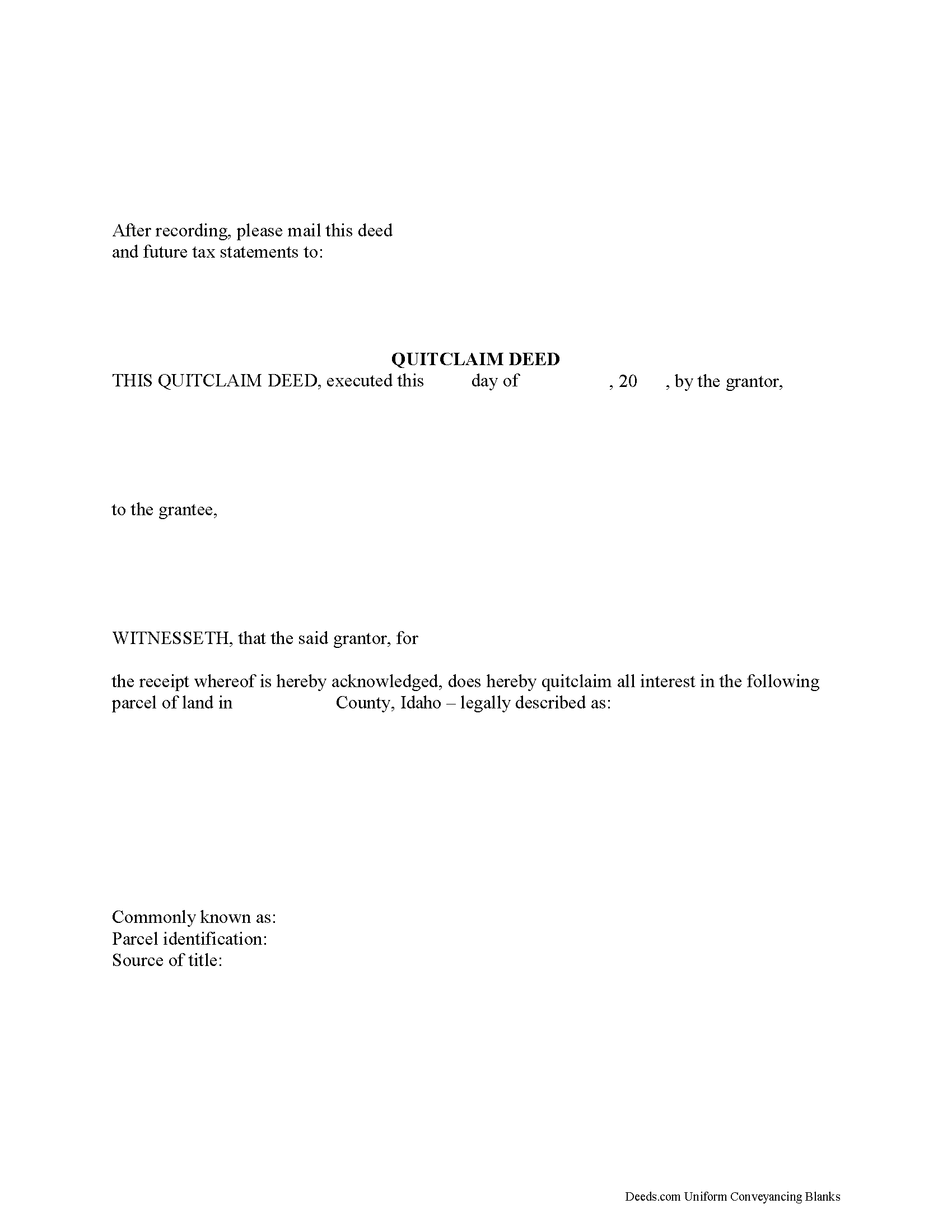
The State of Idaho does not have a statutory form for quitclaim deeds. Instead, the requirements are spread out in different parts of the statutes. Idaho Code 55-505 (2012) defines a conveyance as a transfer in writing. I. C. 55-601 expands on this definition by explaining that a conveyance of real estate must be in writing, signed by the grantor or authorized agent, and also include the grantee's name and complete mailing address. To be accepted for recordation, I. C. 31-2410 notes the need for the name of the individual requesting the instrument's recording, while I. C. 31-2413 lists the items the recorder must present in a reception book. In addition to the information above, a valid quit claim deed must contain a title clearly representing the character of the document and a legal description of the property. Additionally, I. C. 55-612 relates the covenants associated with the word "grant." Because quitclaim deeds contain no warranties, this word should not appear in the text of the conveyance. I. C. 55-818 mentions additional requirements, including the execution date (when the quitclaim deed was signed) and a description of the interest or interests in the property crea... More Information about the Idaho Quitclaim Deed
Gift Deed
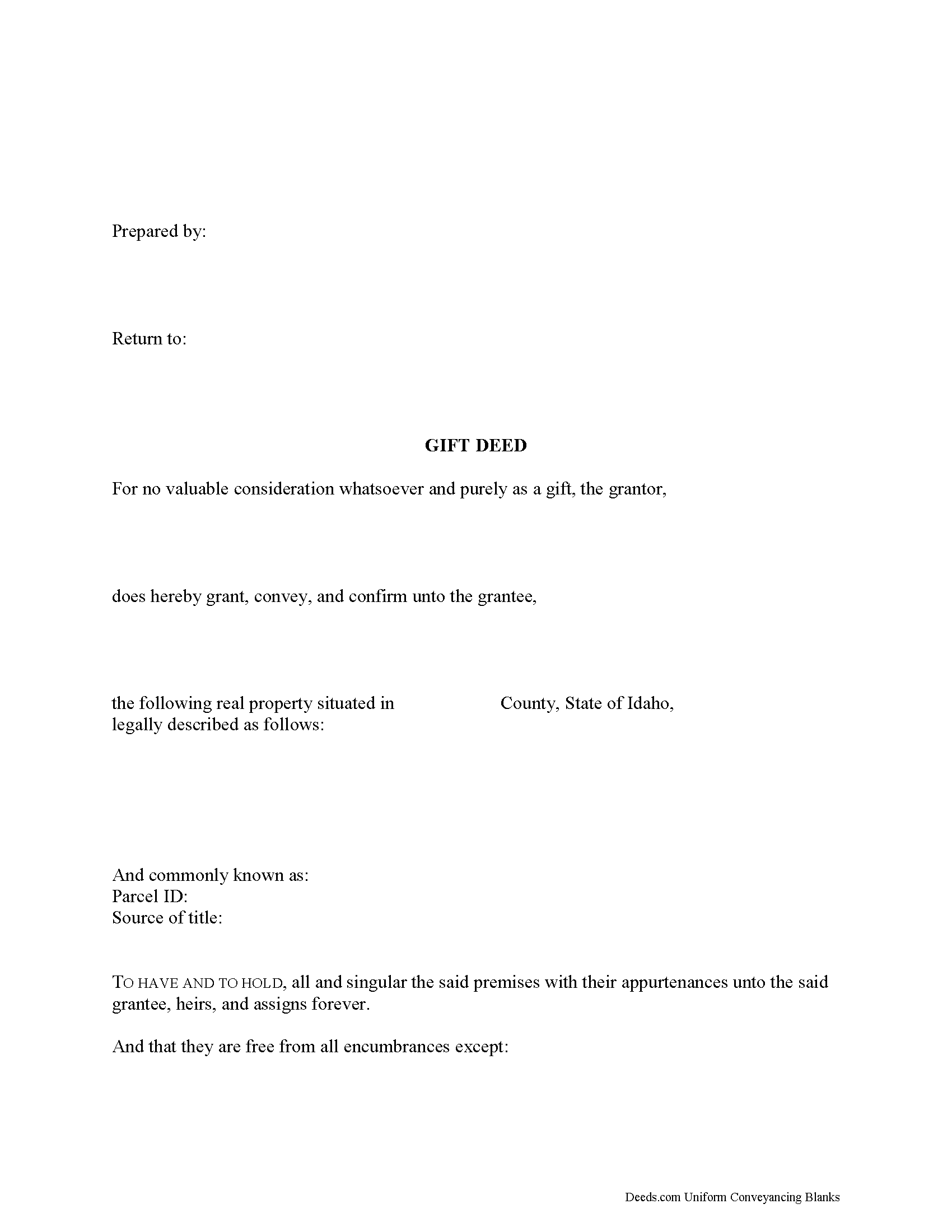
Gifting Real Estate in Idaho
Gift deeds convey title to real property from one party to another with no exchange of consideration, monetary or otherwise. Often used to transfer property between family members or to gift property as a charitable act or donation, these conveyances occur during the grantor's lifetime. Gift deeds must contain language that explicitly states that no consideration is expected or required. Ambiguous language, or references to any type of consideration, can make the gift deed contestable in court.
A lawful gift deed includes the grantor's full name and marital status, as well as the grantee's full name, marital status, vesting information, and mailing address. Vesting describes how the grantee holds title to the property. Generally, real property is owned in either sole ownership or co-ownership. For Idaho residential property, the primary methods for holding title are tenancy in common, joint tenancy, and community property. An estate conveyed to two or more unmarried persons is considered a tenancy in common, unless otherwise specified (I.C. 55-104, 508). A conveyance to two married persons is presumed to vest as community property ( 32-906).
... More Information about the Idaho Gift Deed
Warranty Deed
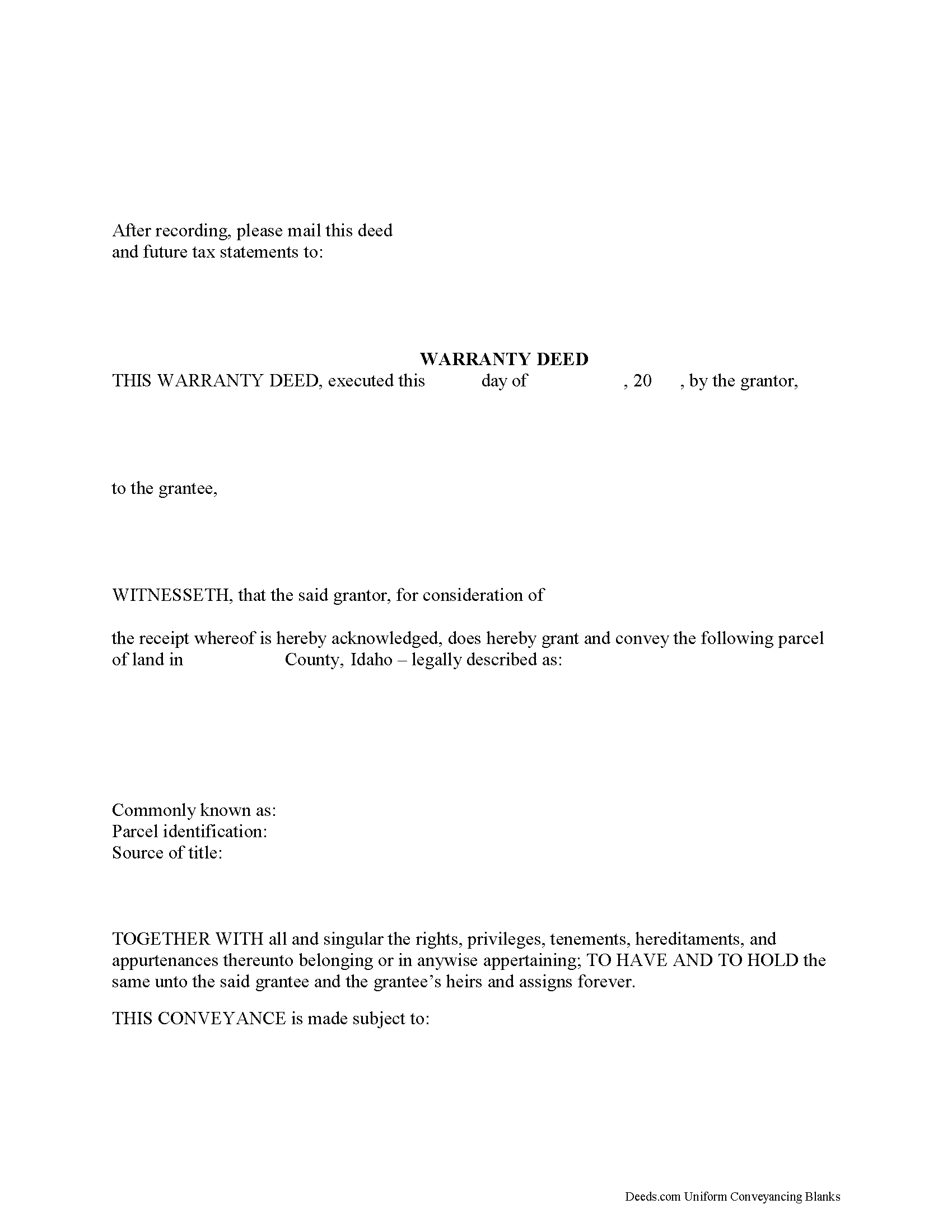
A transfer of real property in Idaho can be made by warranty deed. This type of real estate deed is customary in this state for transfers of real property. There are no statutory forms in Idaho for warranty deeds. The use of the word "grant," when used in a deed, implies the following covenants of warranty: (1) that previous to the execution of the conveyance, the grantor has not conveyed the same property, or any right, title, or interest therein to any person other than the grantee; and (2) that the estate is, at the time of execution of the deed, free from encumbrances done, made, or suffered by the grantor or any person claiming under him (55-612). The covenants in a warranty deed are not limited to the time the grantor owned the property; rather, the covenants extend back to the property's origins.
A warranty deed must be signed and acknowledged by the grantor before the deed can be recorded, or the execution must be proved, and the acknowledgement or proof should be certified in the manner provided by statute. If an instrument has been executed and acknowledged in any other state or territory of the United States according to the laws of the state wherein such acknowledgm... More Information about the Idaho Warranty Deed
Special Warranty Deed

Title to real estate in Idaho can be made by a duly executed special warranty deed. This type of deed must meet statutory requirements for a conveyance of real property.
The Idaho Statutes do not offer a statutory form for a special warranty deed. A special warranty deed includes a covenant from the grantor to defend the title against only the claims and demands of the grantor and those claiming by, through, or under the grantor.
A special warranty deed must be signed and acknowledged by the grantor before the deed can be recorded, or the execution must be proved, and the acknowledgement or proof should be certified in the manner provided by statute. If an instrument has been executed and acknowledged in any other state or territory of the United States according to the laws of the state wherein such acknowledgment was taken, the deed will be entitled to record in Idaho (55-805). All special warranty deeds must contain a proper certificate of acknowledgment in order to be recorded in Idaho. Acknowledgements may be made at any place within the state of Idaho, before a justice or clerk of the Supreme Court, or a notary public, of the Secretary of State, or United States commiss... More Information about the Idaho Special Warranty Deed
Grant Deed
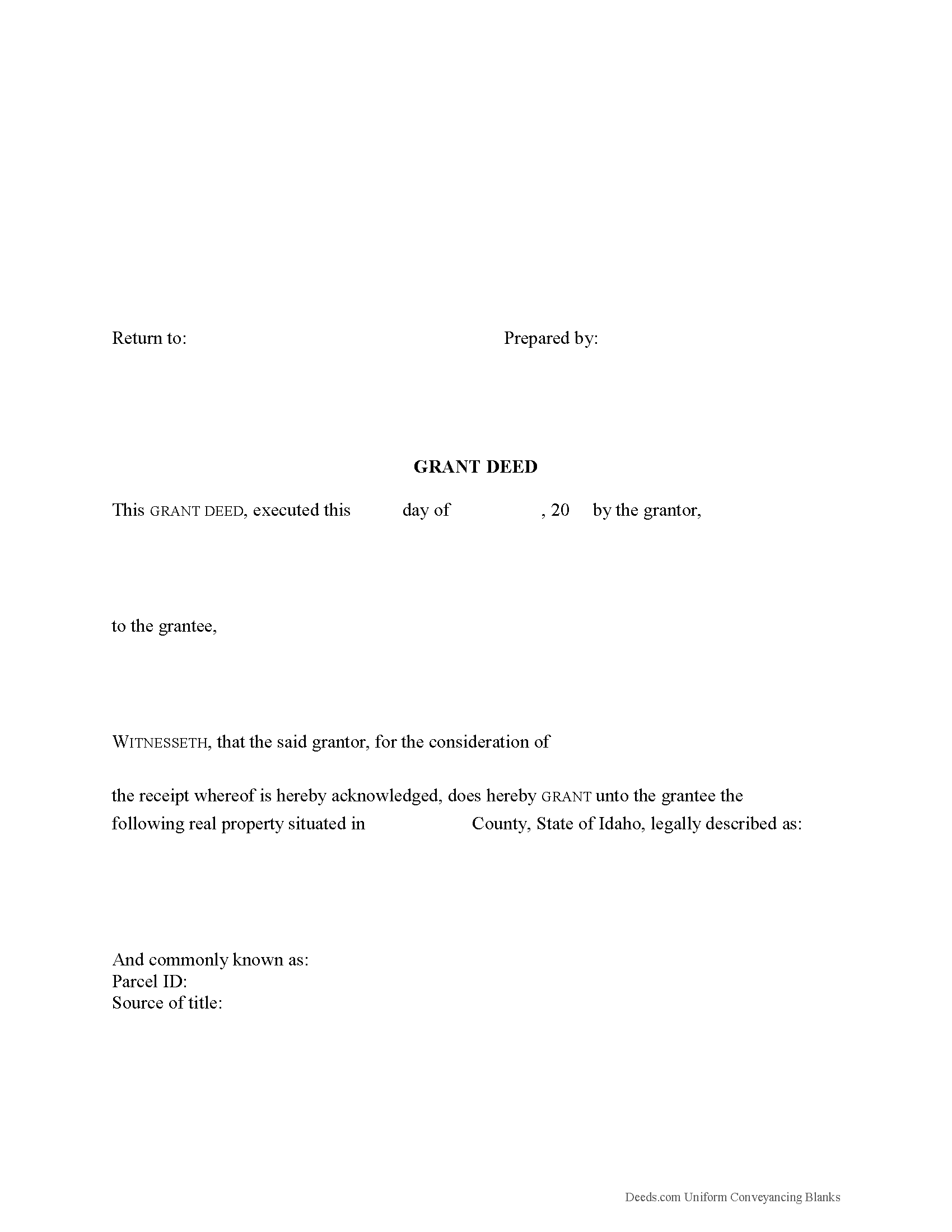
A grant deed, also referred to as a bargain and sale deed, is a legal document used to transfer, or convey, rights in real property from a grantor (seller) to a grantee (buyer). Idaho does not provide a statutory form for a grant deed, but the statutes identify the warranties implied by the word "grant" in a deed. In Idaho, the word "grant" guarantees that previous to the execution of the conveyance, the grantor has not conveyed the same property, or any right, title, or interest therein to any person other than the grantee, and that the estate is free from encumbrances at the time of execution of the deed (I.C. 55-612). Therefore, if the grantee later discovers that the grantor has sold the property to a third party, or if there are encumbrances not mentioned in the deed, the grantee can sue the grantor to recover the value of the property.
In addition to meeting all state and local recording standards, the deed must include the grantor's full name and marital status, as well as the grantee's full name, marital status, mailing address, and vesting. Vesting describes how the grantee holds title to the property. For Idaho residential property, the primary methods for holding ti... More Information about the Idaho Grant Deed
Correction Deed
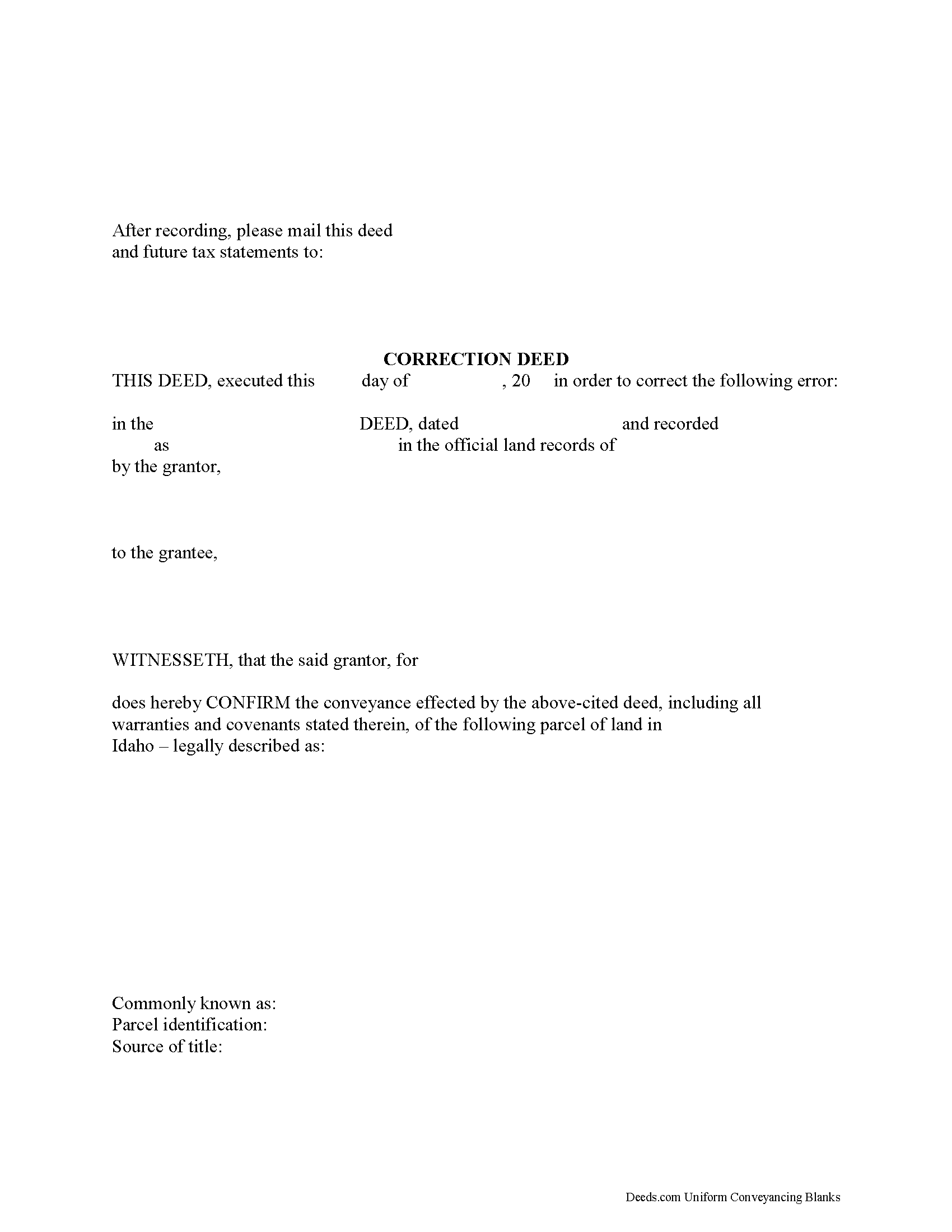
Use the correction deed to correct an error in a previously recorded quitclaim, warranty or grant deed in Idaho.
Errors in a previously recorded deed can be corrected by re-recording the corrected deed or by preparing and recording a new correction deed. This helps to prevent title flaws, which may cause problems when the current owner attempts to sell the property. The correction deed does not convey title but confirms the prior conveyance.
For small errors, corrections can be made directly on the original deed and initialed by the signors before the deed is re-recorded. For lengthier errors, the best option is to prepare and record a new corrective deed, executed from the original grantor to the original grantee. Apart from supplying the corrected information, it must identify the reason for correcting and reference the prior deed by date, recording number and title.
When correcting the legal description or plat identification, both the grantor and the grantee should sign the corrective deed. If the original grantor is not available for some reason, an affidavit, signed by the grantee and indexed under the name of both the grantor and grantee, may be the best way to ef... More Information about the Idaho Correction Deed
Easement Deed
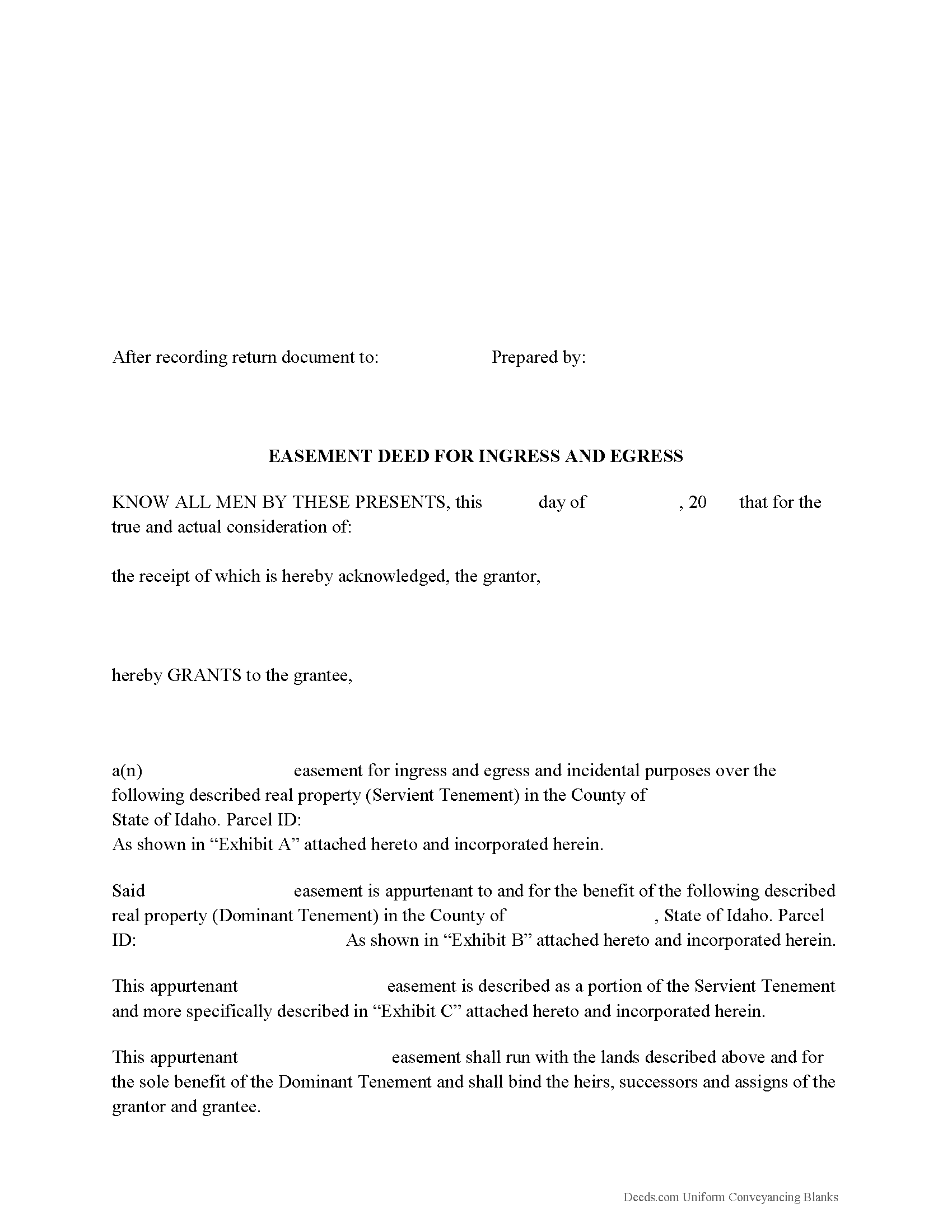
An easement is the right or interest to use another's land for a specific purpose. An easement deed is the instrument in writing which entitles the holder to a privilege or benefit, such as to place access points, pipe lines, or roads on another's land. Easements can be temporary or permanent. An easement in Idaho can also be obtained for the purpose of exposure of a solar energy device to sunlight, which is known as a solar easement. This type of easement is created in writing and is subject to the same requirements as other easements (55-615). A conservation easement can also be created in Idaho, and must also conform to the laws for other easements and conveyances (55-2101).
A transfer of real property in this state will pass all the easements attached to the land, and will create in favor thereof an easement to use other real property of the person whose estate is transferred, in the same manner and to the same extent as such property was obviously and permanently used by the person whose estate is transferred, for the benefit thereof, at the time when the transfer was completed or agreed upon (55-603).
In order for an easement deed to be eligible for recording, it must ... More Information about the Idaho Easement Deed
Termination, Cancellation of Easement / Right of Way
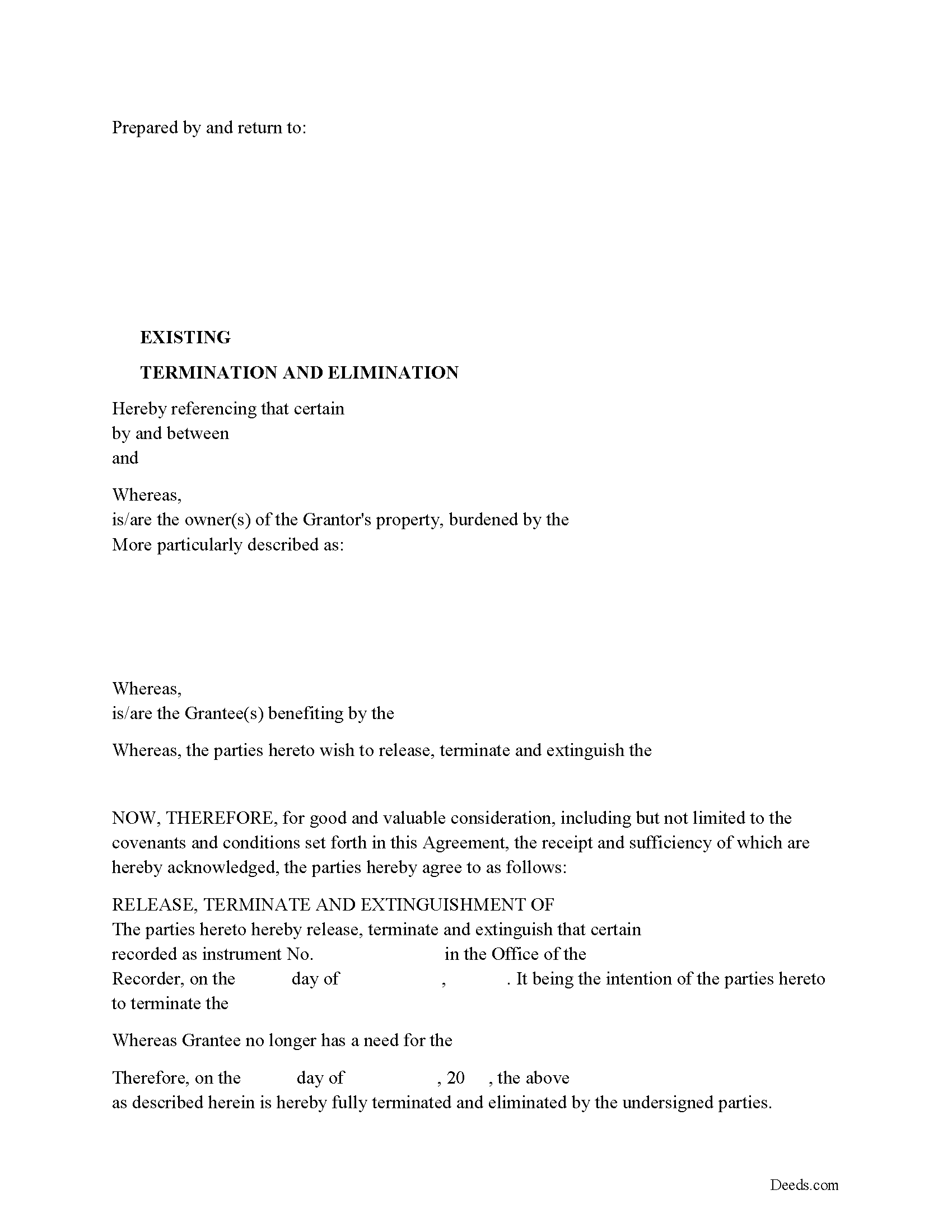
Use this form to release, terminate, extinguish a previously recorded document that involves access to and from a property.
Documents such as:
1. Easement Deeds or Agreements (An easement is a non-possessory interest in land, granting the right to use someone else's property for a specific purpose, like a driveway or utility line)
2. Access Roads
3. Right of Ways
4. Utility Easements (Power, Gas, Water, Sewer, Etc.)
5. Drainage Easements
This document allows the owner of the land, burdened by the access and the party that benefits from the access, to sign an agreement releasing the property from such access, ... More Information about the Idaho Termination, Cancellation of Easement / Right of Way
Mineral Deed
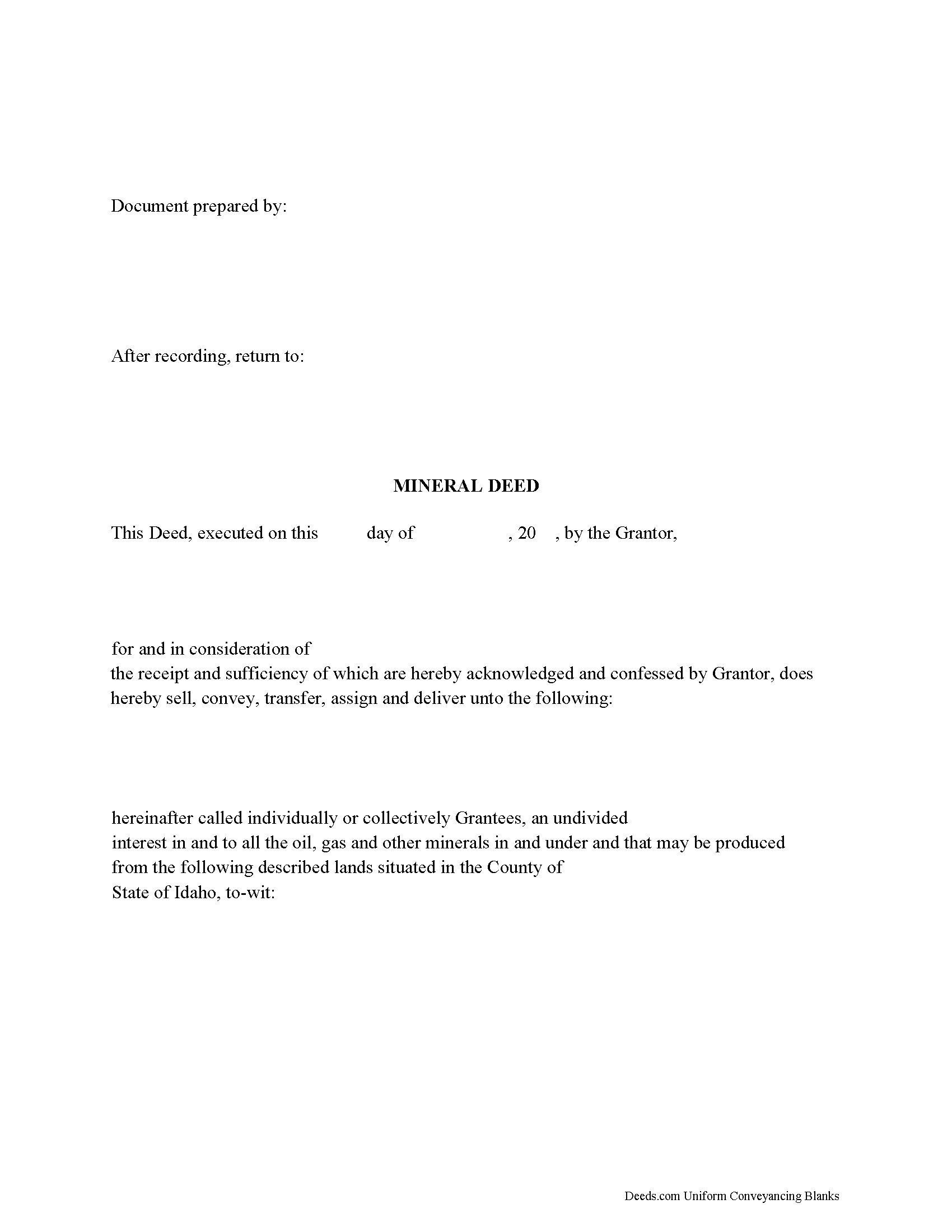
The General Mineral Deed in Idaho transfers oil, gas, and mineral rights from the grantor to the grantee. THIS IS NOT A LEASE. There are no Exceptions or Reservations included.
The transfer includes the oil, gas and other minerals of every kind and nature. It also transfers any and all rights to receive royalties, overriding royalties, net profits interests or other payments out of or with respect to those oil, gas and other minerals. The Grantor can stipulate the percentage of Mineral Rights the Grantee will receive and is made subject to any rights existing under any valid and subsisting oil and gas lease or leases of record.
This general mineral deed gives the grantee the right to access, for the purpose of mining, drilling, exploring, operating and developing said lands for oil, gas, and other minerals, and storing handling, transporting and marketing of such.
In this document the Grantor Warrants and will defend said Title to Grantee. Use of this document has a permanent effect on your rights to the property, if you are not completely sure of what you are executing seek the advice of a legal professional.... More Information about the Idaho Mineral Deed
Mineral Deed with Quitclaim Covenants
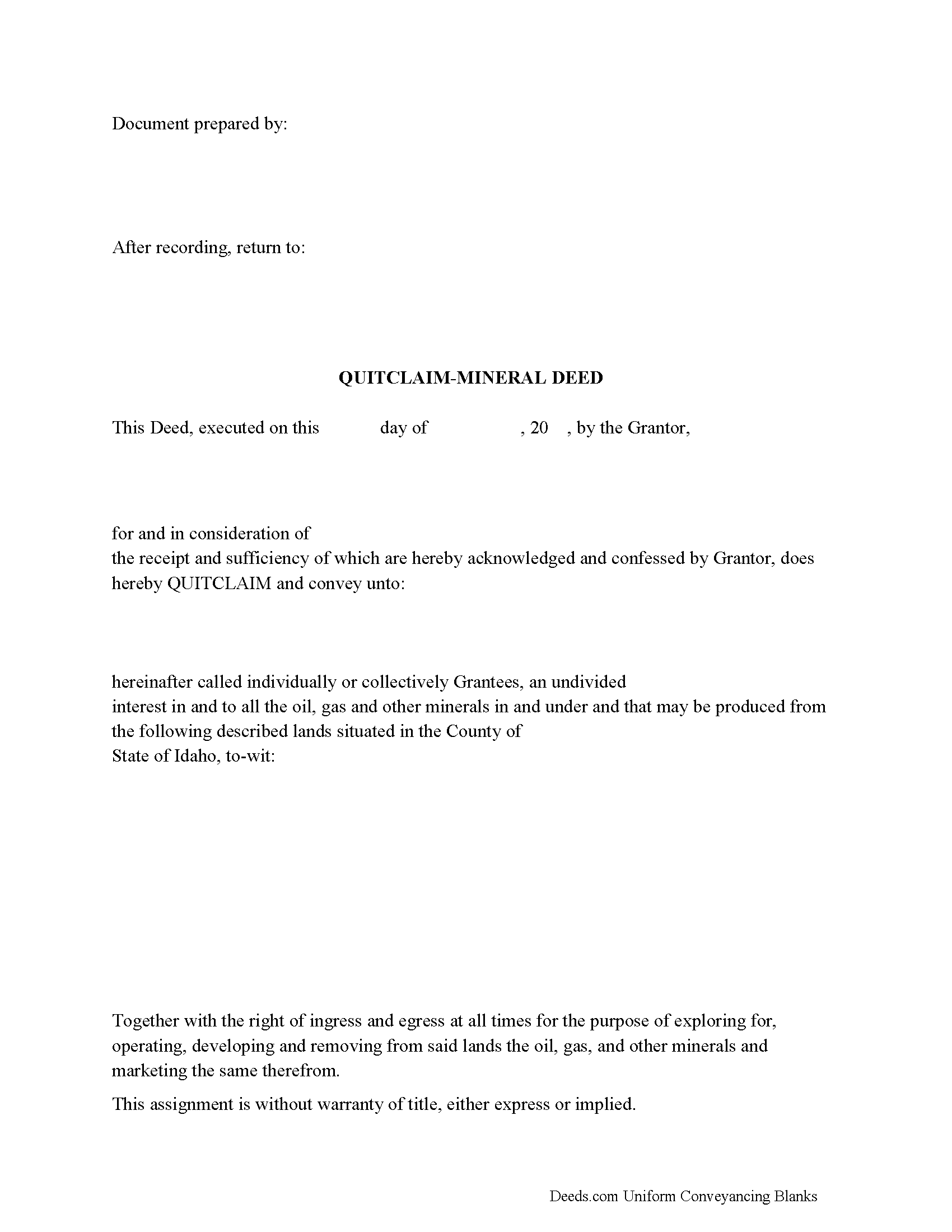
The General Mineral Deed in Idaho Quitclaims oil, gas, and mineral rights from the grantor to the grantee. THIS IS NOT A LEASE. There are no Exceptions or Reservations included.
The transfer includes the oil, gas and other minerals of every kind and nature. The Grantor can stipulate the percentage of Mineral Rights the Grantee will receive.
This general mineral deed gives the grantee the right to access, for the purpose of mining, drilling, exploring, operating and developing said lands for oil, gas, and other minerals, and storing handling, transporting and marketing of such.
The seller, or grantor Quitclaims the mineral rights and does NOT accept responsibility to any discrepancy of title (This assignment is without warranty of title, either express or implied)
Uses: Mineral deeds with quitclaim are often used in situations where the grantor wants to quickly release any interest they might have in mineral rights, such as in settling estates, resolving disputes, clearing up uncertainties about ownership in a title's history or when mineral rights have previously been severed or fragmented from surface rights and cloud a title, making it difficult to transfer property. ... More Information about the Idaho Mineral Deed with Quitclaim Covenants
Trustee Deed
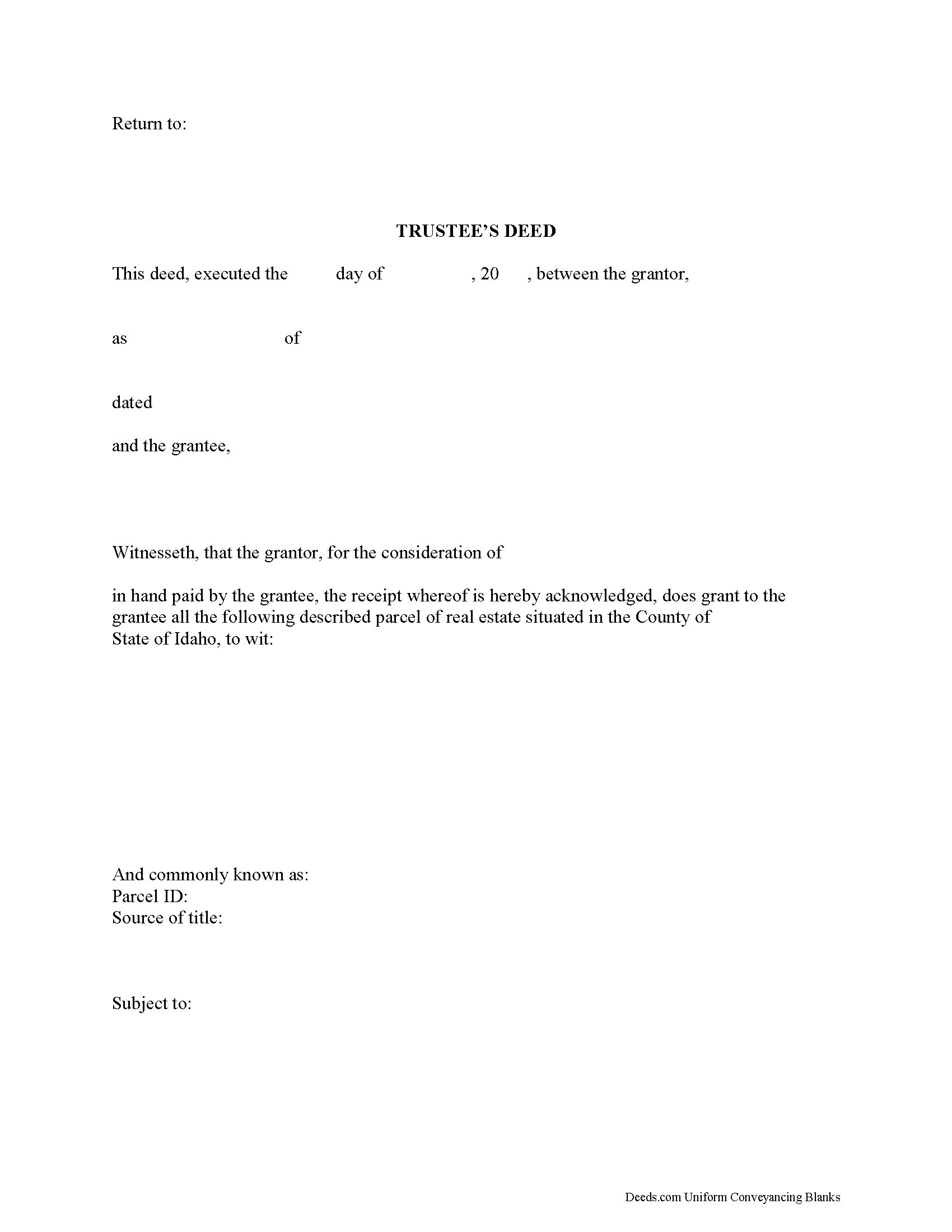
The Idaho trustee's deed conveys property out of a trust. This type of deed is named for the person executing the instrument rather than the type warranties it contains. The trustee's deed is a modified fee simple deed, and contains only the covenants stated in I. C. 55-612.
The deed names the trustee as the grantor and the name and date of the trust under which the trustee is acting. A certificate of trust under I.C. 68-115 is sometimes used in conjunction with transactions by a trustee.
As with all instruments of conveyance in Idaho, the grantee's full name and mailing address is required in the granting clause (I.C. 55-601). To delineate the specific parcel conveyed, the legal description of the real property must appear on the conveyance. All acting trustees need to sign the deed in the presence of a notary public before it is submitted for recording in the county in which the real property is situated.... More Information about the Idaho Trustee Deed
Deed of Trust
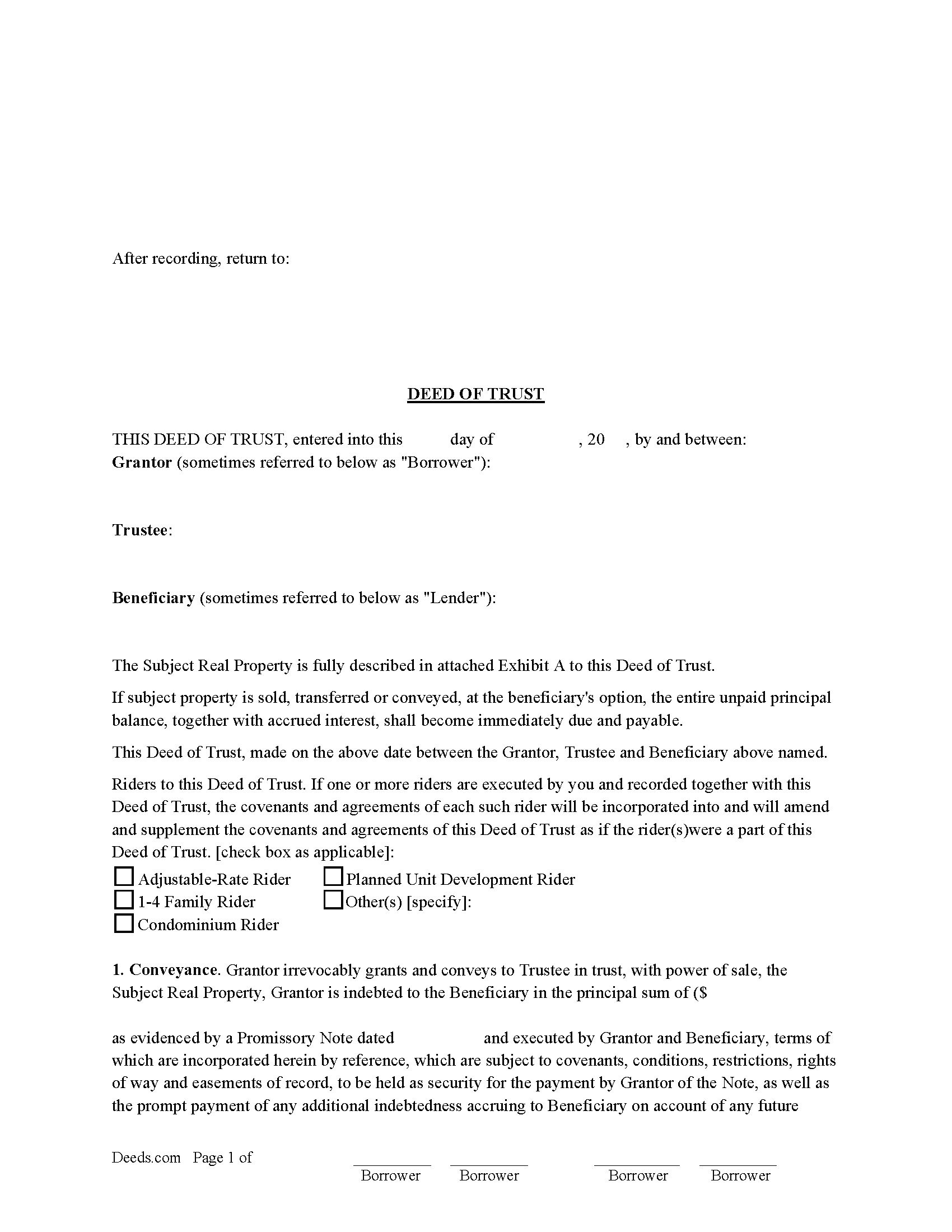
A Deed of Trust is the most common instrument used to finance real property in Idaho. A Deed of Trust with a power of sale allows for a non-judicial foreclosure, saving time and expense for the lender. A Deed of Trust/Promissory Note that include stringent default terms can be beneficial to the lender. Use these forms for financing real property: vacant land, residential property, rental units, condominiums, small commercial and planned unit developments.
The promissory note is held by the lender and used for reconveyance once the deed of trust has been satisfied, it is considered to be severable and addresses past due dates, late charges, fees for additional days late, maturity dates, traditional finance and balloon payments, default rates, default terms and conditions, etc.
45-1502. DEFINITIONS --- TRUSTEE'S CHARGE. As used in this act:
(1) "Beneficiary" means the person named or otherwise designated in a trust deed as the person for whose benefit a trust deed is given, or his successor in interest, and who shall not be the trustee.
(2) "Grantor" means the person conveying real property by a trust deed as security for the performance of an obligation.
(3) "Trust deed... More Information about the Idaho Deed of Trust
Deed of Full Reconveyance - for Deed of Trust
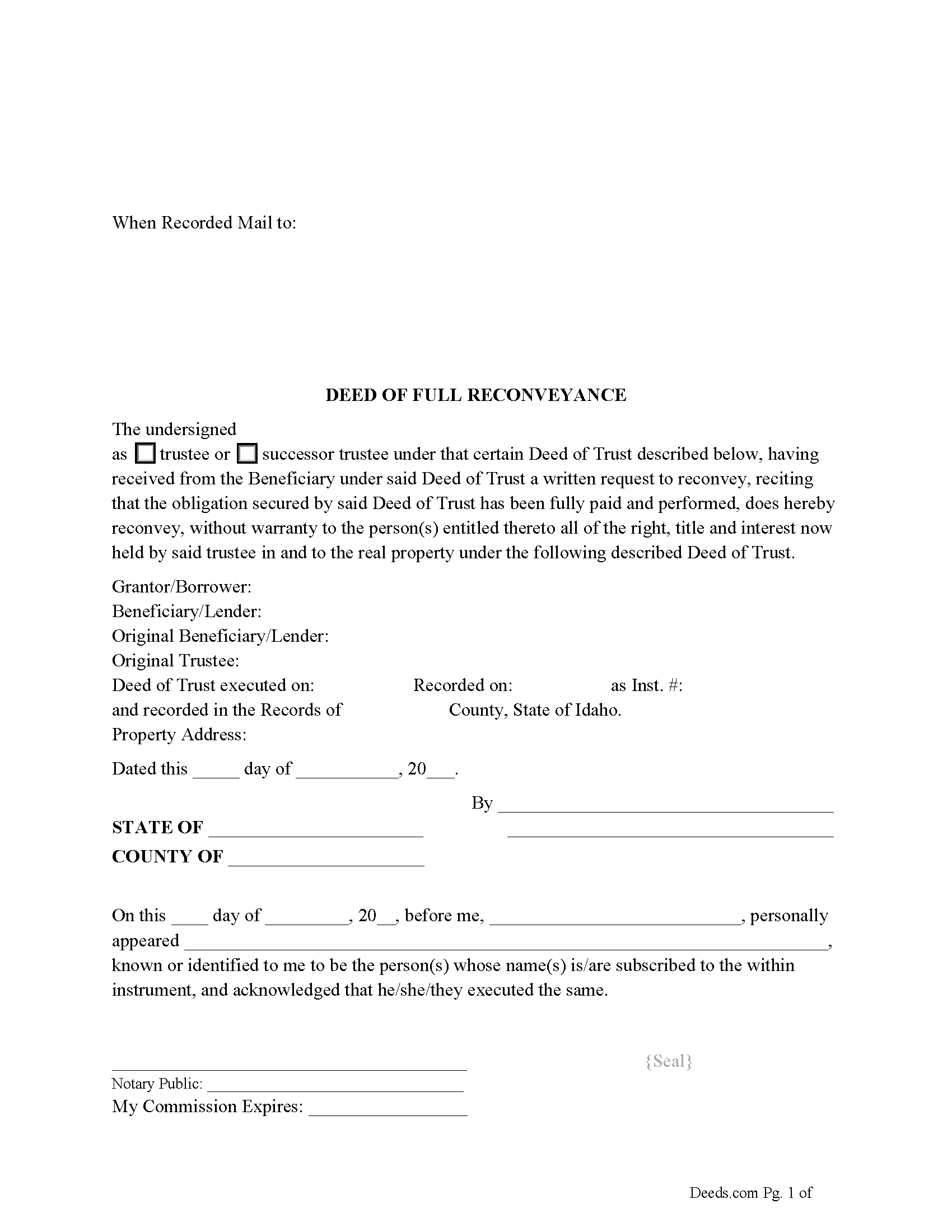
This form is used by the trustee or successor trustee to reconvey a Deed of Trust when fully paid and performed. This takes place when the current trustee is notified in writing from the beneficiary/lender. The full reconveyance is then recorded in the county where the property is located, generally within 30 days of satisfaction and notification, to avoid penalty.
45-1514. RECONVEYANCE UPON SATISFACTION OF OBLIGATION. Upon performance of the obligation secured by the deed of trust, the trustee upon written request of the beneficiary shall reconvey the estate of real property described in the deed of trust to the grantor; providing that in the event of such performance and the refusal of any beneficiary to so request or the trustee to so reconvey, as above provided, such beneficiary or trustee shall be liable as provided by law in the case of refusal to execute a discharge or satisfaction of a mortgage on real property.
For use in Idaho only.
... More Information about the Idaho Deed of Full Reconveyance - for Deed of Trust
Substitution of Trustee - for Deed of Trust
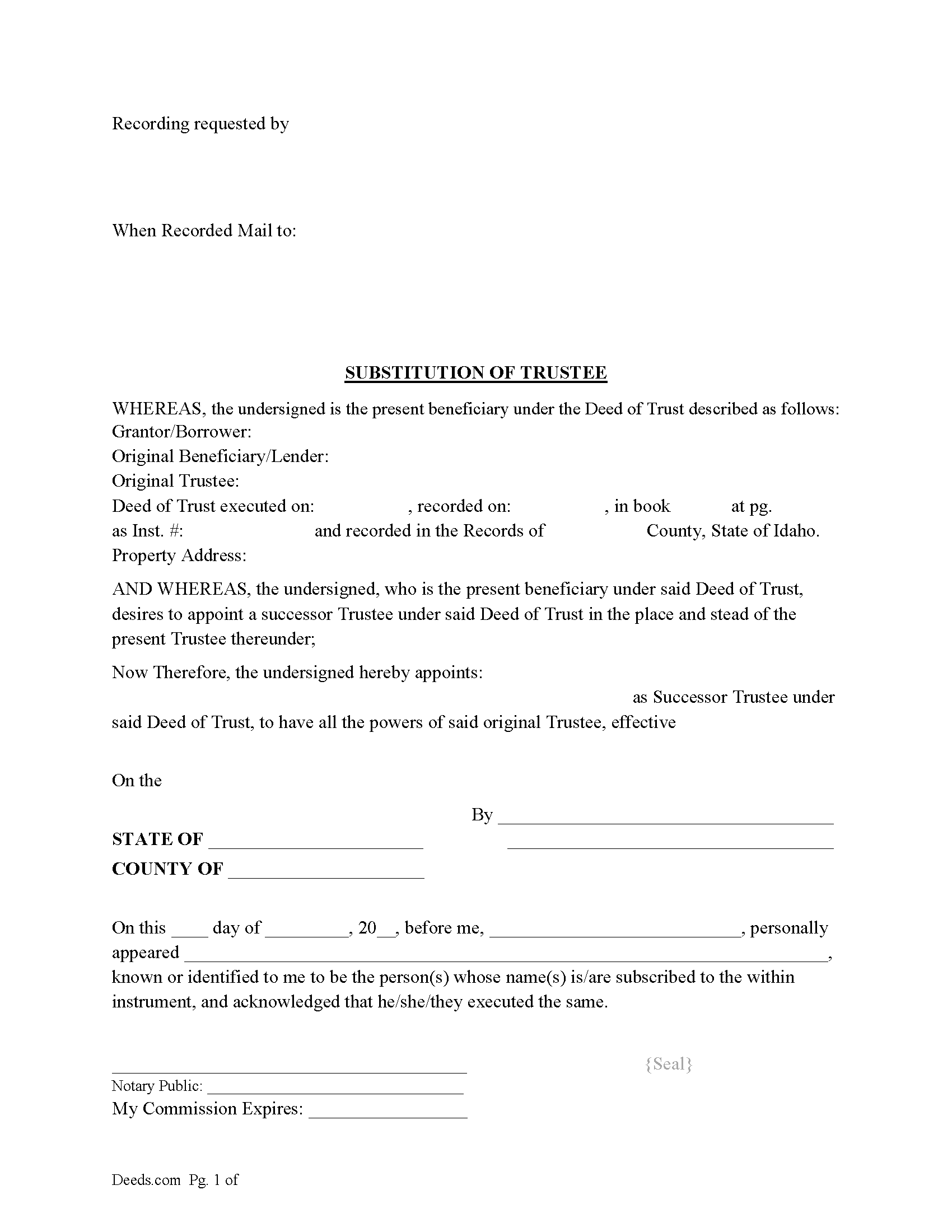
This form is issued by the current beneficiary/lender to replace an existing trustee with a successor trustee in a Deed of Trust. This is commonly performed when the current trustee resigns, can't or won't act on a foreclosure, reconveyance, etc.
45-1504. TRUSTEE OF TRUST DEED --- WHO MAY SERVE --- SUCCESSORS.
(1) The trustee of a trust deed under this act shall be:
(a) Any member of the Idaho state bar;
(b) Any bank or savings and loan association authorized to do business under the laws of Idaho or the United States;
(c) An authorized trust institution having a charter under chapter 32, title 26, Idaho Code, or any corporation authorized to conduct a trust business under the laws of the United States; or
(d) A licensed title insurance agent or title insurance company authorized to transact business under the laws of the state of Idaho.
(2) The trustee may resign at its own election or be replaced by the beneficiary. The trustee shall give prompt written notice of its resignation to the beneficiary. The resignation of the trustee shall become effective upon the recording of the notice of resignation in each county in which the deed of trust is recorded. If a trus... More Information about the Idaho Substitution of Trustee - for Deed of Trust
Substitution of Trustee and Deed of Full Reconveyance
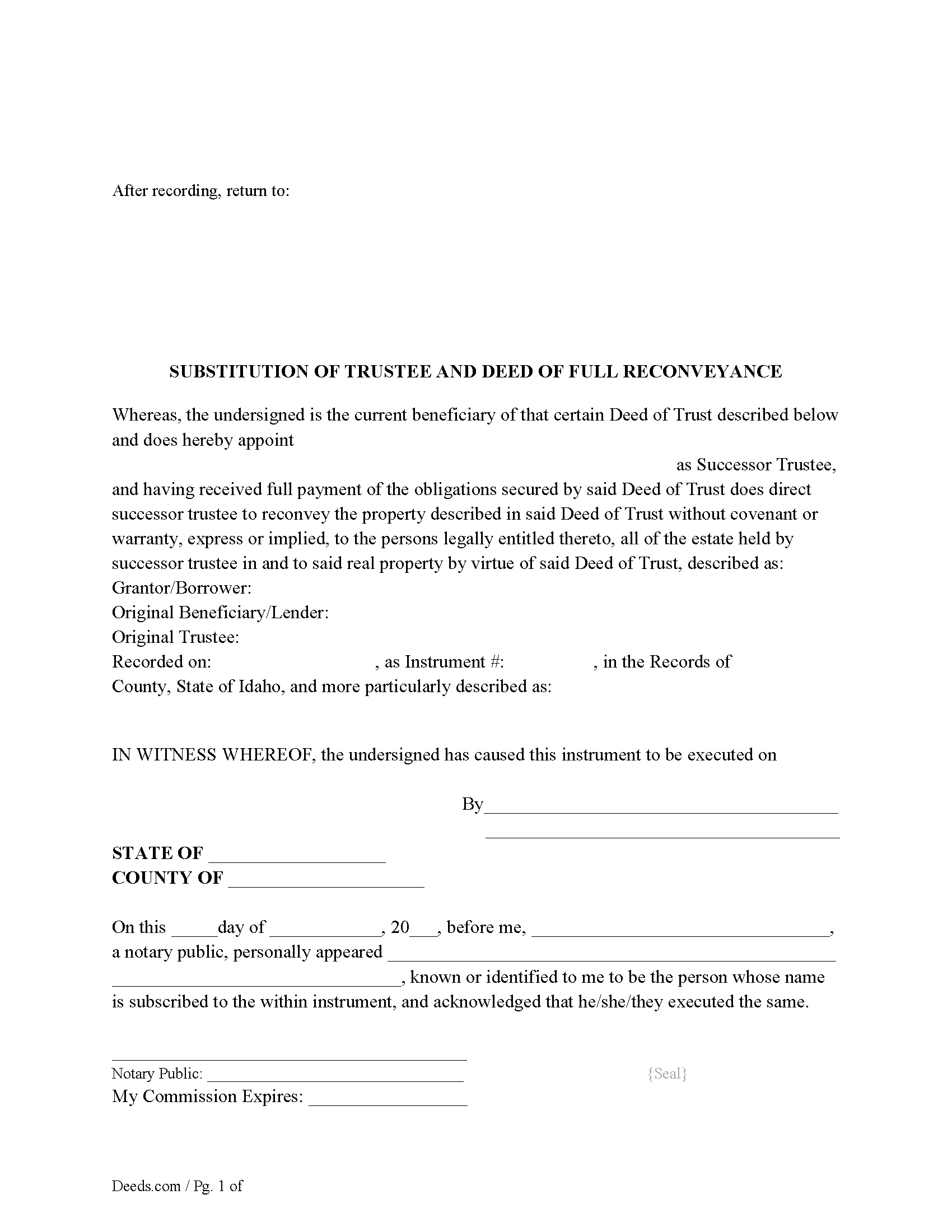
This form is used by the current beneficiary/lender to substitute an existing trustee with a successor trustee who then has the power to reconvey the Deed of Trust back to the grantor/borrower(s). This is typically performed when the loan/note has been satisfied and the current trustee can't or won't act, or the beneficiary/lender decides to choose a different trustee to reconvey the Deed of Trust in question. This form includes the required written request from the beneficiary to the trustee to reconvey the property. Acknowledgments are required from the current beneficiary/lender and the appointed successor trustee, included are two notary statements, allowing flexibility of the beneficiary acknowledging at one time and place and the successor trustee acknowledging at another time and place if need be.
45-1514. RECONVEYANCE UPON SATISFACTION OF OBLIGATION.
Upon performance of the obligation secured by the deed of trust, the trustee upon written request of the beneficiary shall reconvey the estate of real property described in the deed of trust to the grantor; providing that in the event of such performance and the refusal of any beneficiary to so request or the trustee to s... More Information about the Idaho Substitution of Trustee and Deed of Full Reconveyance
Assignment of Deed of Trust
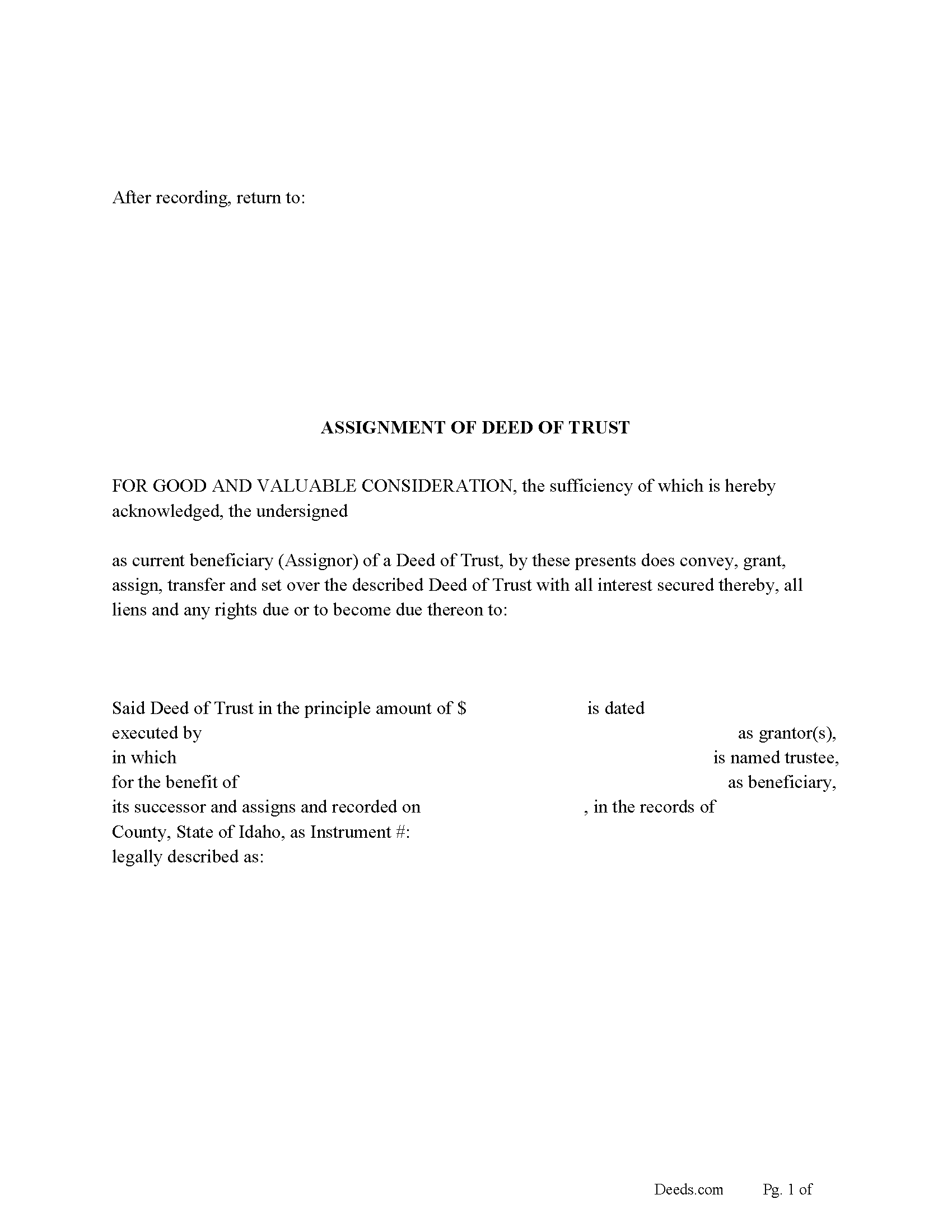
A recorded instrument in which the current Lender/beneficiary/assignor assigns an existing Deed of Trust to an assignee. This is typically performed when a Deed of Trust has been sold.
Notice of Assignment of Deed of Trust Form Included.
To avoid penalty the truth and lending act requires that borrowers be notified when their Deed of Trust debt has been sold, transferred, or assigned to a new creditor.
For use in Idaho only.
... More Information about the Idaho Assignment of Deed of Trust
Trustee Deed Upon Sale
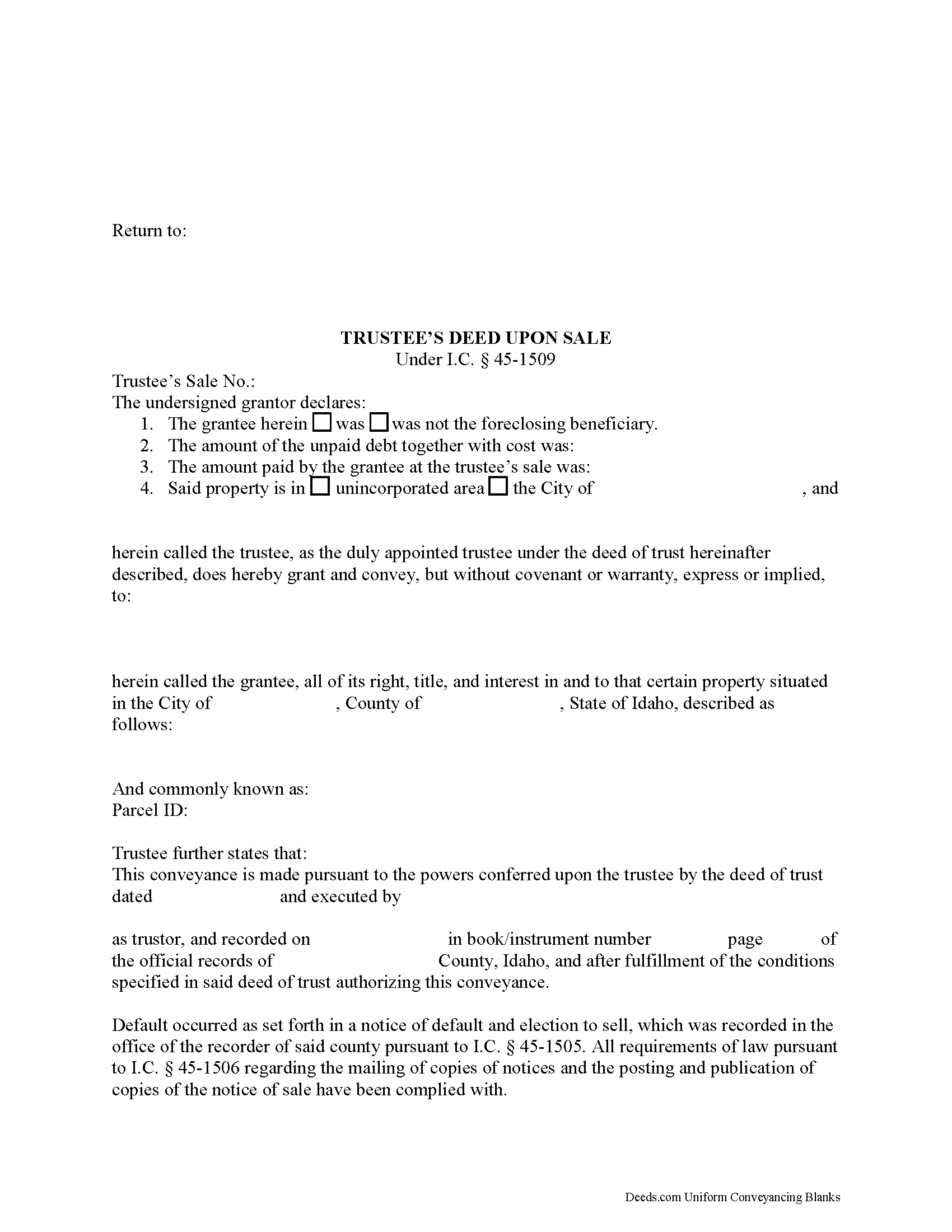
The Idaho Trustee's Deed Upon Sale is codified at I.C. 45-1509.
A trustee uses a trustee's deed upon sale to convey real property sold at a trustee's sale following foreclosure under a deed of trust. A deed of trust is a security instrument that, along with a promissory note, sets out the terms for repaying a loan used to purchase real property. Some states use deeds of trust in the place of mortgages.
The three parties involved in a deed of trust are the lender, the borrower (the grantor under the deed of trust), and the trustee. The trustee is generally a title insurance agent who holds legal title to the real property until the borrower has fulfilled the obligation of the deed of trust. The borrower holds equitable title.
If the borrower defaults on the terms of the deed of trust, the trustee, under the direction of the lender, may act on the power of sale clause in the deed, and initiate non-judicial foreclosure proceedings on the property. Statutory requirements, including the mailing of notices of default and sale, must be met before a trustee's sale is held at public auction. See I.C. Title 45 for more information.
The trustee's deed names the trustee as the gra... More Information about the Idaho Trustee Deed Upon Sale
Affidavit of Successor
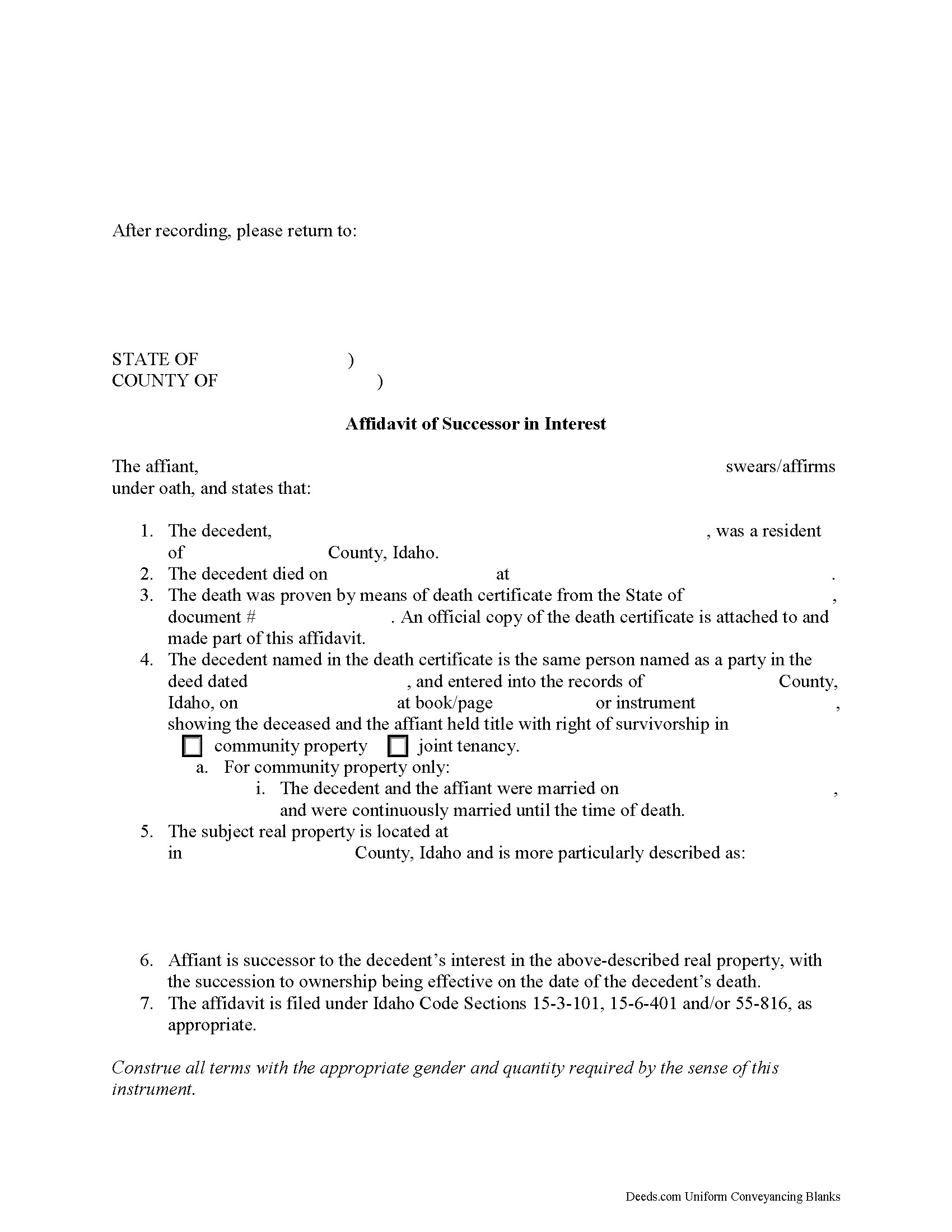
Idaho's statutes allow three primary methods for co-ownership of real estate: tenancy in common, joint tenancy, and community property. See Idaho Code Section 55-104.
Holding title as tenants in common means that each owner has title rights to a separate portion of the property. The owner may sell or otherwise convey the share independently from the others, and it may be included in his/her will.
Joint tenancy and community property, on the other hand, include the right of survivorship, meaning that when one owner dies, his/her share of the property is distributed amongst the survivors. Note that community property is only available to married couples and often requires a recorded community property agreement for full effect.
To formalize the transfer, remaining owners may use an affidavit of survivorship. By executing and recording this document, along with an official copy of the deceased owner's death certificate, the property and taxation records are updated to show the new status. This helps to maintain a clear chain of title (ownership history), which is important for future transfers of the property.
Each situation is unique, so seek legal advice for complex sit... More Information about the Idaho Affidavit of Successor
Personal Representative Deed
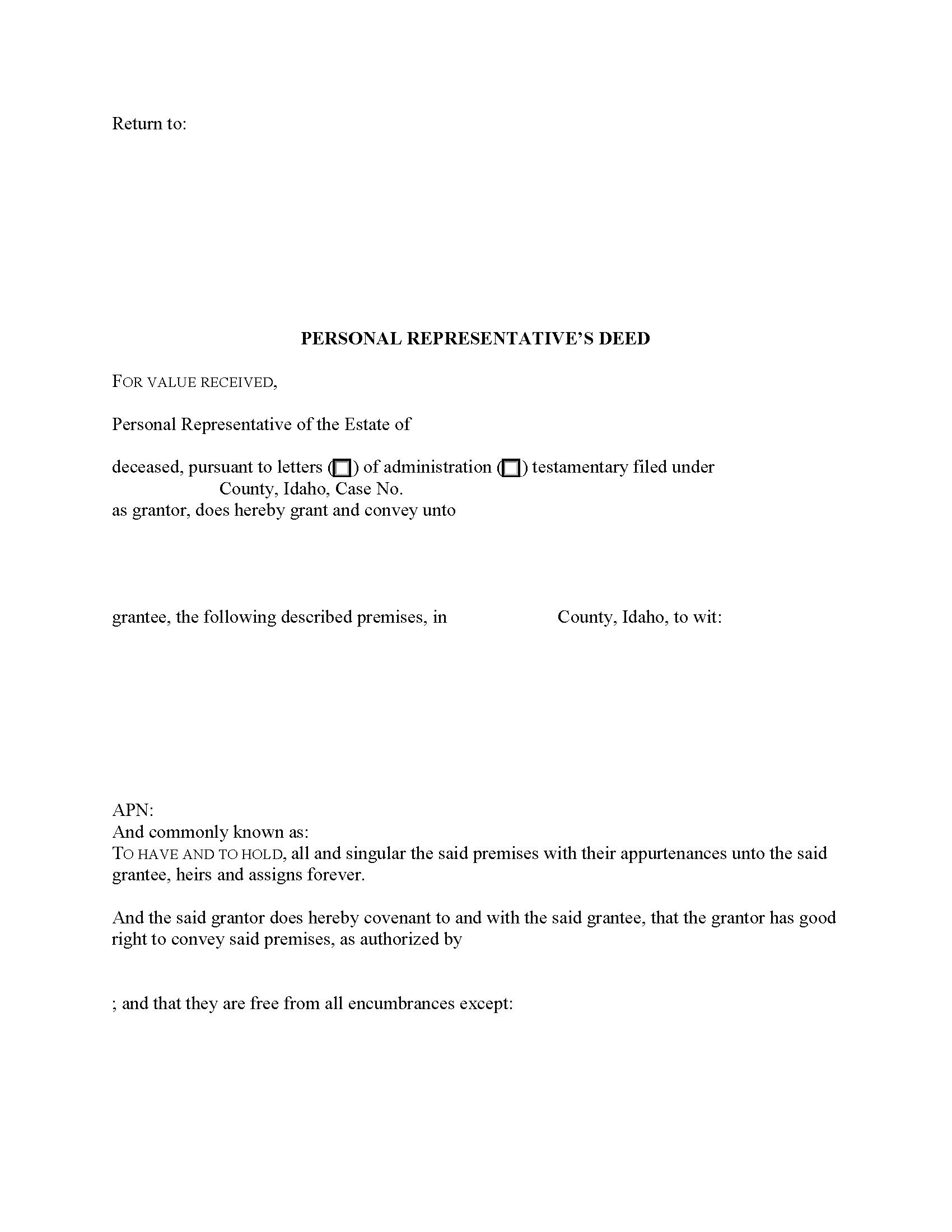
A personal representative (PR), appointed or authorized by the relevant probate court, uses a personal representative's deed to convey title to someone who is not the decedent's heir. The PR may need to sell the decedent's real property to pay the estate's debts or to liquidate the estate for ease of distribution to beneficiaries.
The Personal Representative's Deed is named for the acting fiduciary, but is functionally equivalent to a limited warranty deed. A limited warranty deed in Idaho contains covenants that the grantor has not previously conveyed the same title, and that the estate is free from encumbrances made by or under the grantor ( 55-612).
In addition to meeting the standard state and local standards for deeds in Idaho, personal representative's deeds might need additional information about the decedent, the representative, the court case, etc. Record the executed deed, along with any supporting documentation and fees, with the office responsible for maintaining land records in the county where the property is situated.
Probate can be complicated, so consult an attorney with questions regarding estate administration and conveyances of real property in Idaho.... More Information about the Idaho Personal Representative Deed
Personal Representative Deed of Distribution
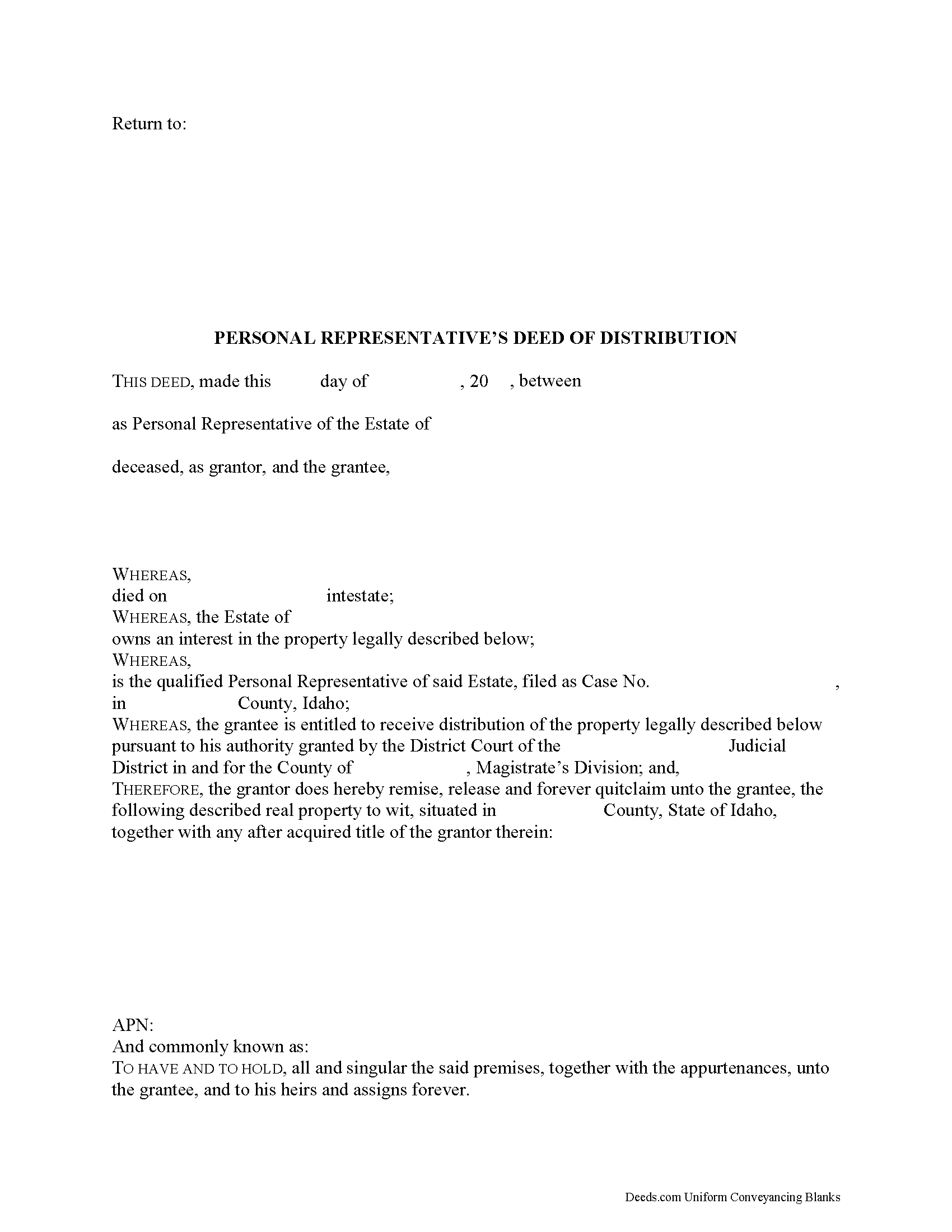
A personal representative uses a deed of distribution to transfer title to a decedent's real property to heirs (distributees) entitled to receive it. A distributee is anyone who receives a decedent's property other than as a purchaser or creditor (I.C. 15-1-201(11)).
Deeds of distribution are executed and recorded as evidence that the distributee has received the decedent's title to the property when the decedent has died intestate (without a will). See I.C. 15-3-907.
In addition to the standard state and local requirements for deeds in Idaho, personal representative's deeds might need additional information about the decedent, the representative, the court case, etc. The deed quitclaims the grantor's title and offers no warranty. Record the executed deed, along with any fees and supporting documentation, in the office responsible for maintaining the land records of the county where the property is located.
Probate can be complicated, so consult an attorney with questions regarding estate administration and conveyances of real property in Idaho.... More Information about the Idaho Personal Representative Deed of Distribution
Special Power of Attorney for Real Property
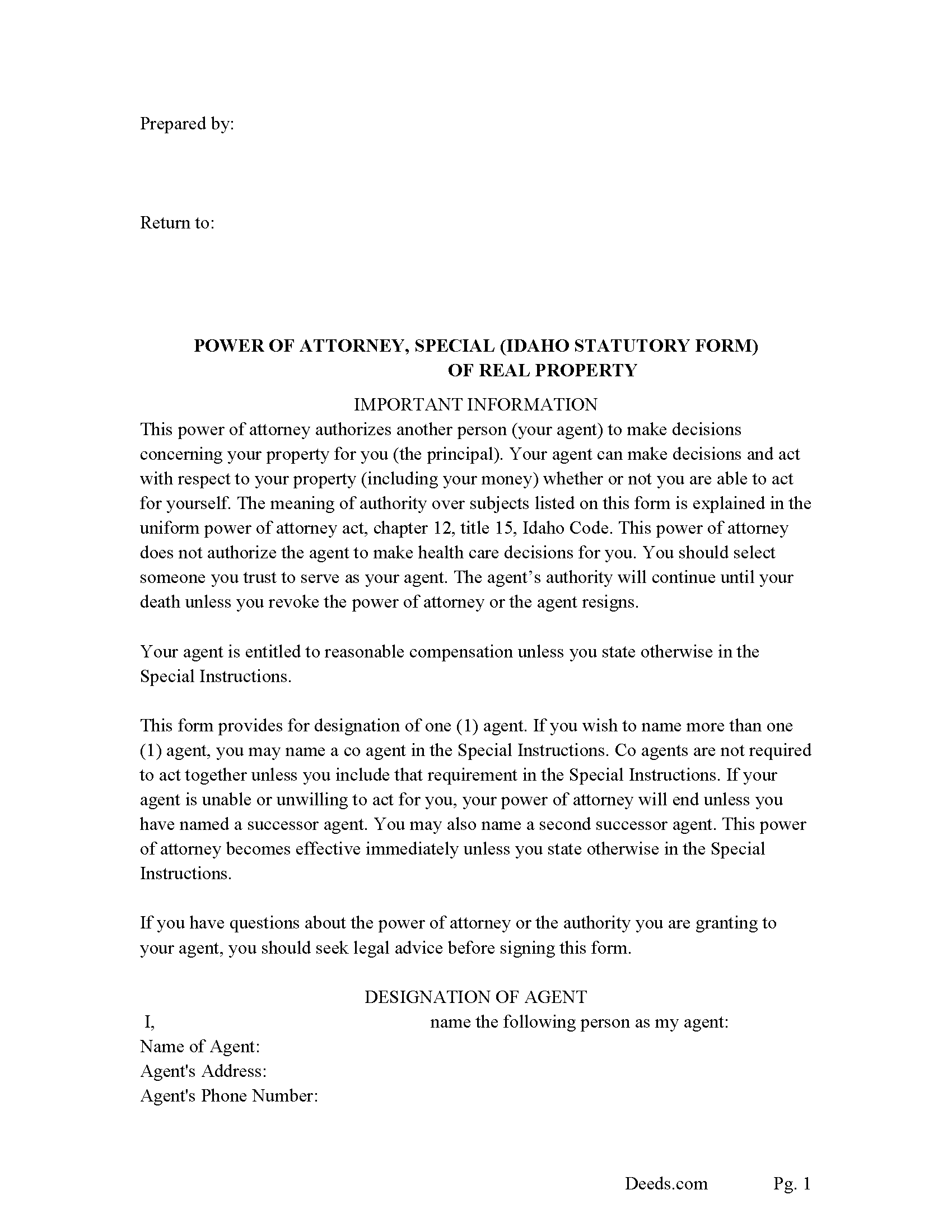
This form is used by a principle to empower an agent to act in his/her name and stead. Its sole purpose is to either purchase, sell or refinance a specific property. Unless stated otherwise, this power of attorney is durable and stays active in the case of the principal's disability.
"Principal" means an individual who grants authority to an agent in a power of attorney. 15-12-102 (9)
"Agent" means a person granted authority to act for a principal under a power of attorney, whether denominated an agent, attorney-in-fact, or otherwise. The term includes an original agent, coagent, successor agent or a person to which an agent's authority is delegated. 15-12-102 (1)
For use in Idaho only.
... More Information about the Idaho Special Power of Attorney for Real Property
Statutory Durable Power of Attorney
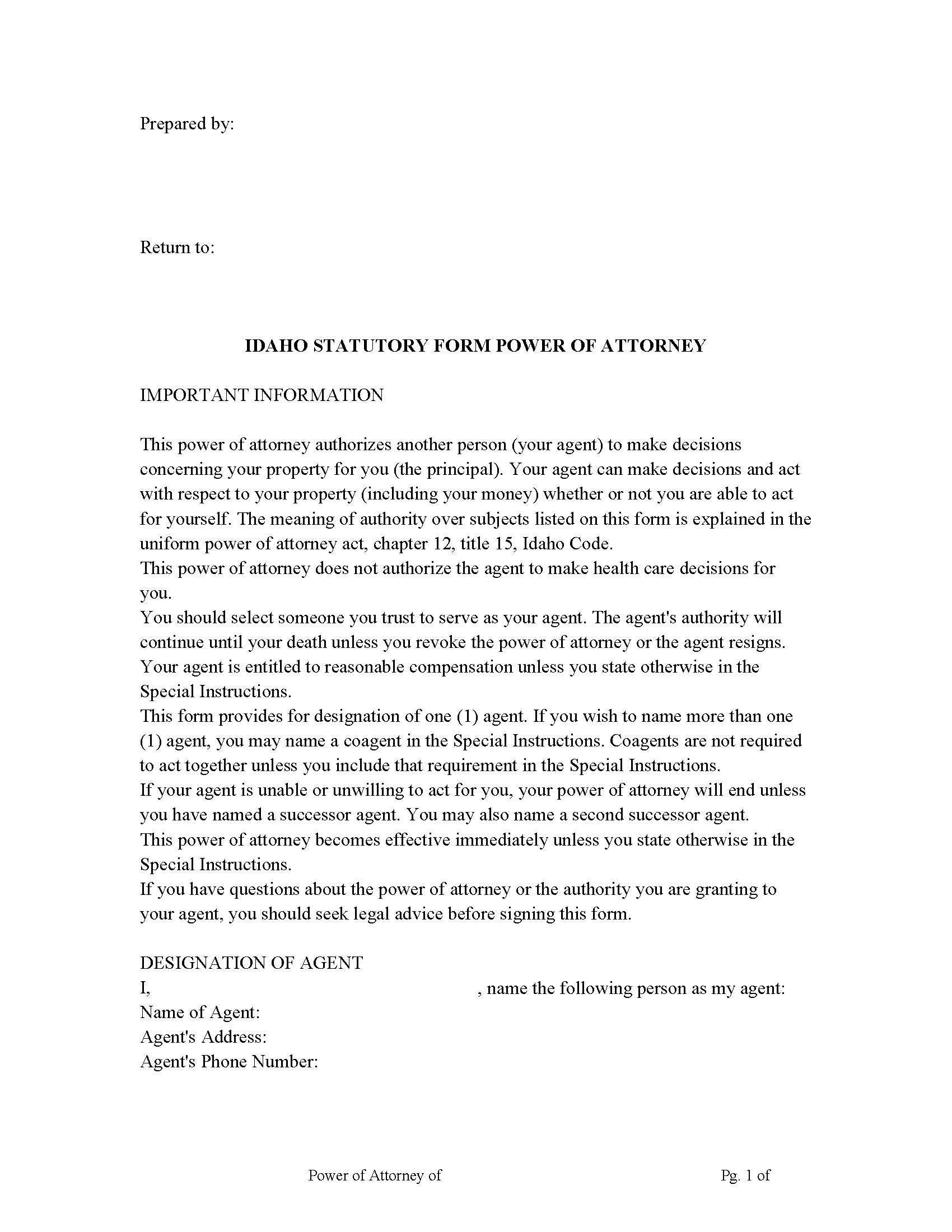
This power of attorney is durable and is (not terminated by the principal's incapacity.) [unless it expressly provides that it is terminated by the incapacity of the principal.] (15-12-102(2)) [15-12-104.]
What does a power of attorney do? In general, allows your agent to do any lawful act with respect a subject and all property related to the subject as if you were there yourself.
Subjects in which you can approve or deny. (Note: each subject is defined by an Idaho Statute.)
Real Property
Tangible Personal Property
Stocks and Bonds
Commodities and Options
Banks and Other Financial Institutions
Operation of an Entity or Business
Insurance and Annuities
Estates, Trusts, and Other Beneficial Interests
Claims and Litigation
Personal and Family Maintenance
Benefits from Governmental Programs or Civil or Military Service
Retirement Plans
Taxes
Subjects your agent can NOT do without your specific authority:
Create, amend, revoke, or terminate an inter vivos trust
(Make a gift, subject to the limitations of the uniform power of attorney act, chapter 12, title 15, Idaho Code, and any special instructions in this power of attorney
Make a gift without limita... More Information about the Idaho Statutory Durable Power of Attorney
Disclaimer of Interest
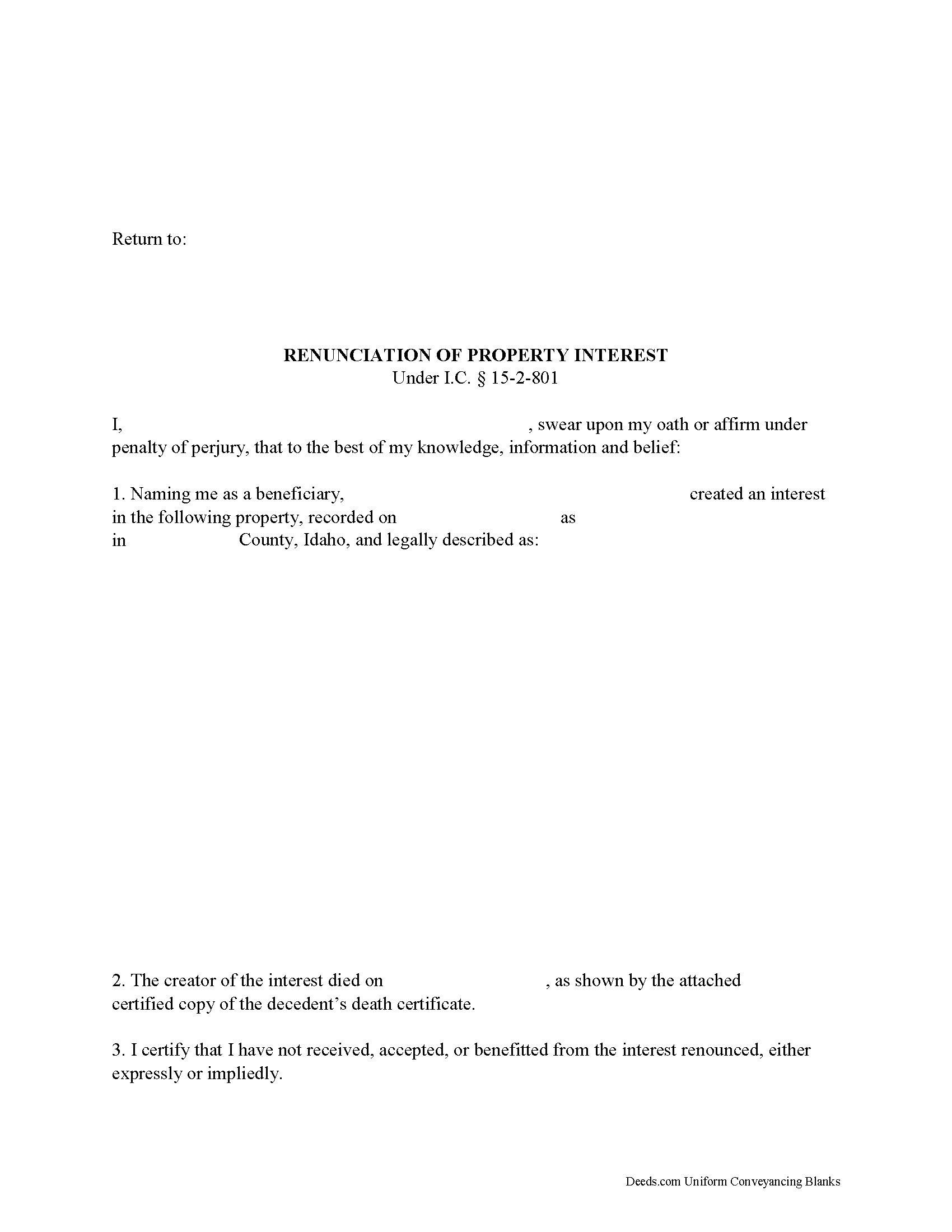
Idaho Renunciation of Property
Under the Idaho Statutes, the beneficiary of an interest in property may renounce the gift, either in part or in full (I.C. 15-2-801). Note that the option to renounce is only available to beneficiaries who have not acted in any way to indicate acceptance or ownership of the interest (15-2-801 (4)).
The document must be in writing and include a description of the interest, a declaration of intent to renounce all or a defined portion of the interest, and be signed by the renouncing party (15-2-801 (1) (b)).
Deliver the document within nine months of the transfer (e.g., the death of the creator of the interest) to the personal representative of the decedent's estate or the trustee. It must also be filed in the court of the county where proceedings concerning the decedent's estate are or would be pending (15-2-801 (2)). If real property is involved, record a copy of the document at the recorder's office in the county where the property is located in order to avoid any ambiguity regarding the chain of title.
A renunciation is irrevocable and binding for the renouncing party and his or her creditors (15-2-801 (6)), so be sure to consult an... More Information about the Idaho Disclaimer of Interest
Certificate of Trust
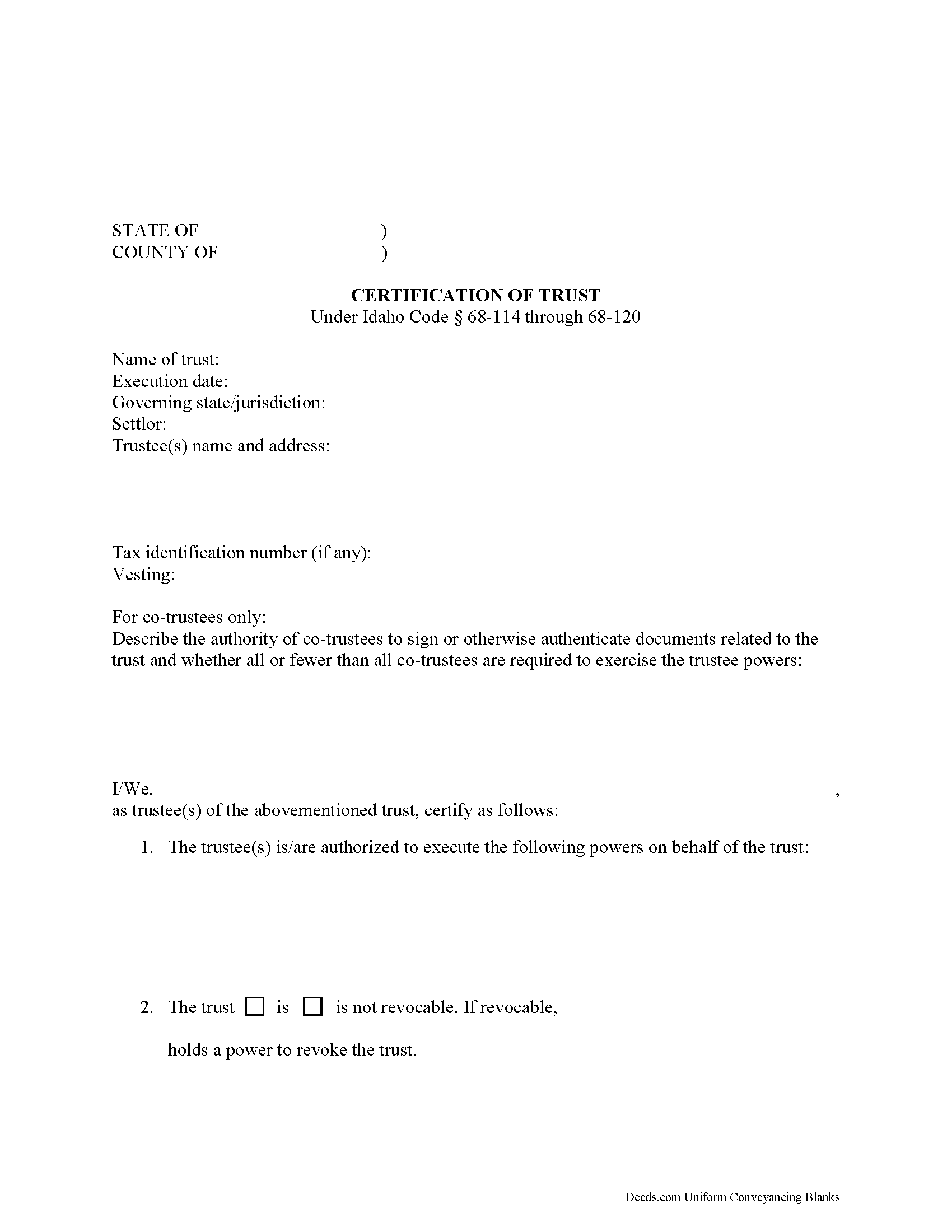
Under the Idaho Uniform Trustees' Powers Act, (Sections 68-114 through 68-120, Idaho Code), trustees of Idaho trusts may present a certificate supplying relevant information when engaging in transactions involving trust property. The executed certificate provides assurances about the validity of the trust and protects those who rely on the facts contained in the certificate.... More Information about the Idaho Certificate of Trust
Lis Pendens Form
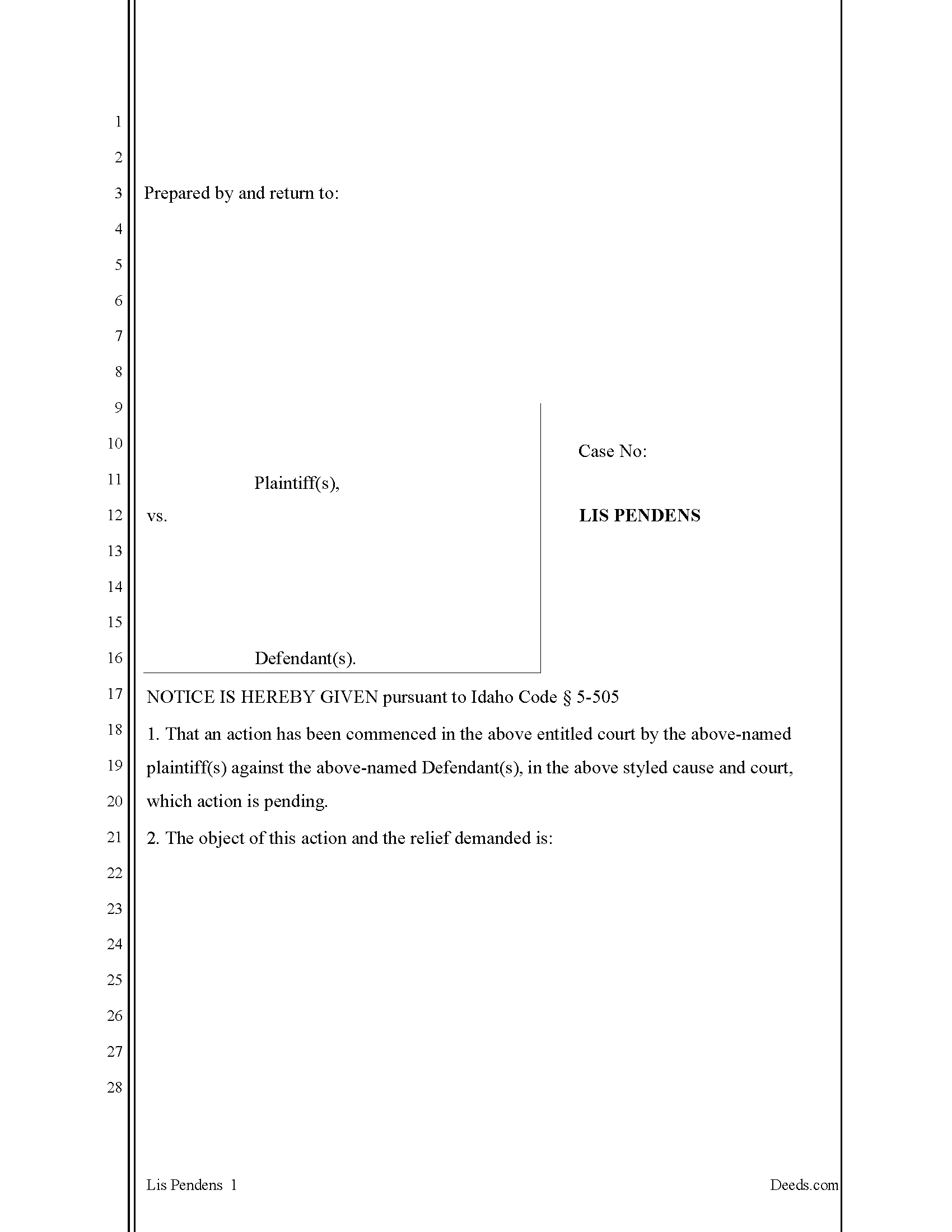
In general, when a complaint is filed that affects (title or the right of possession of real property), a plaintiff or defendant may file a Lis Pendens with the County Recorder, in all counties in which the property lies. At the time of filing, the Lis Pendens becomes (constructive notice) to would be (purchasers and incumbrancers) that there is a suit pending, that could affect the property and that they would bound to the outcome of said case.
Such Lis Pendens Notice will contain:
(the names of the parties)
(the object of the action or defense and )
(a description of the property in that county affected thereby.) (5-505)
... More Information about the Idaho Lis Pendens Form
Release of Lis Pendens Form
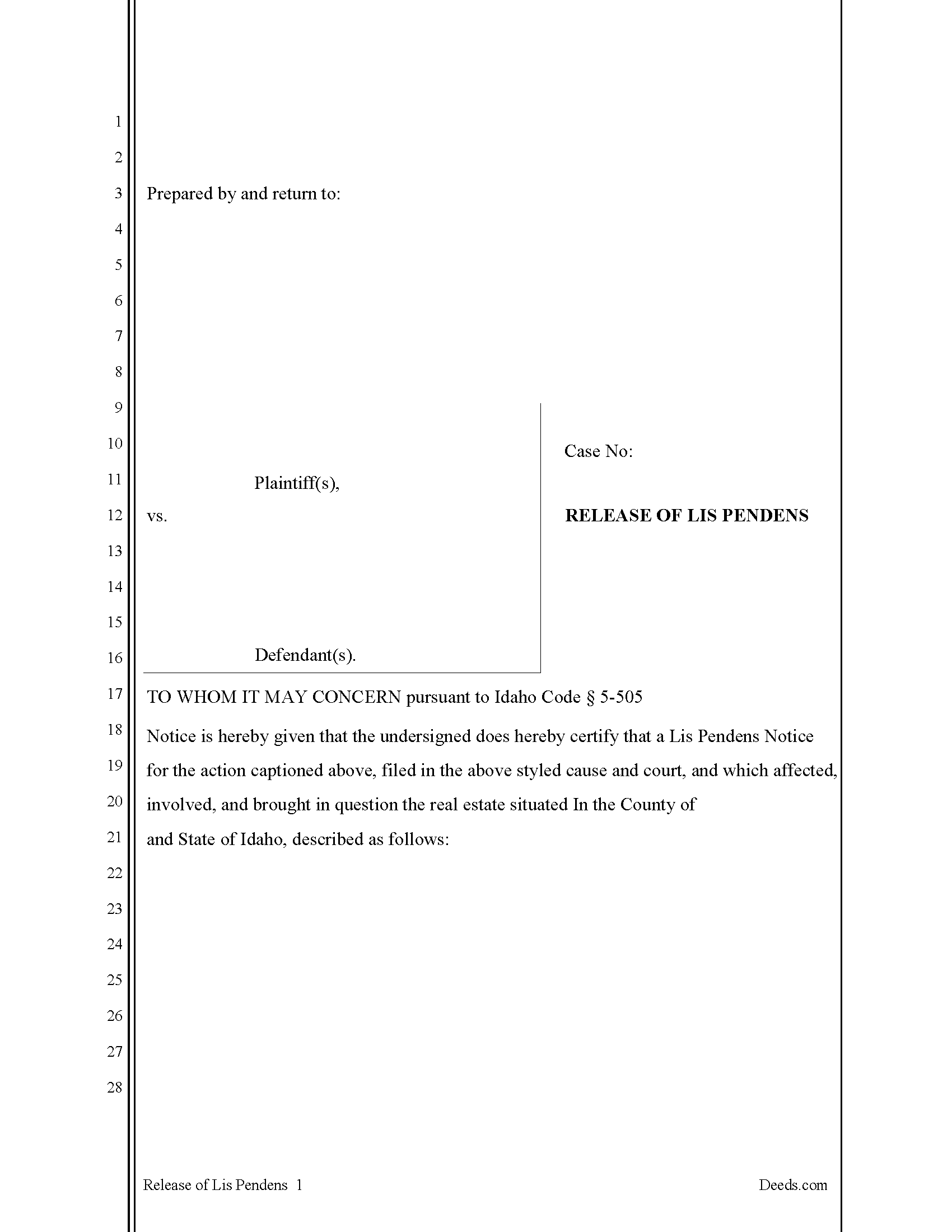
Use this form to release a previously recorded Lis Pendens document, re Idaho Statute 5-505, formatted to accommodate multiple parties.... More Information about the Idaho Release of Lis Pendens Form